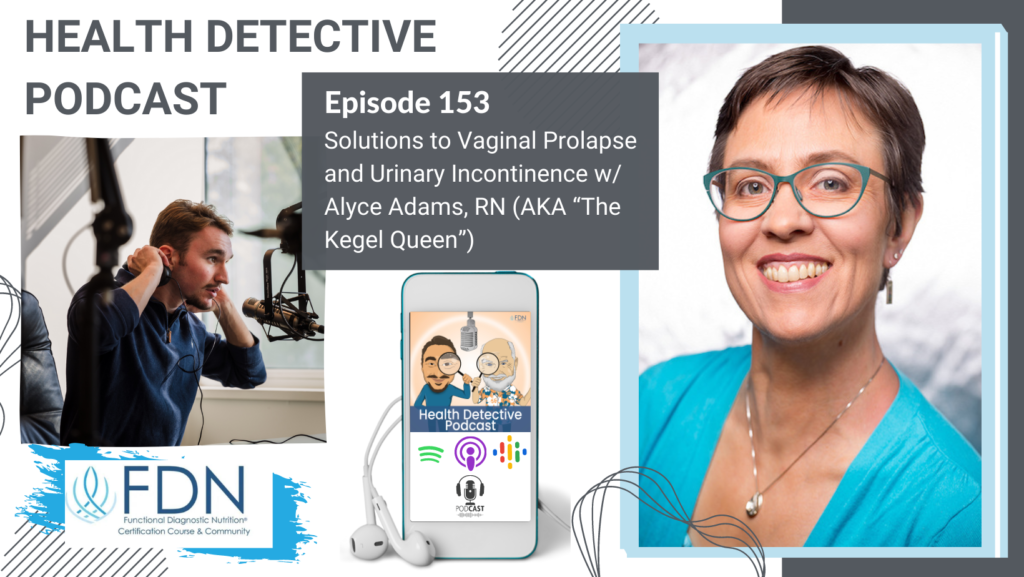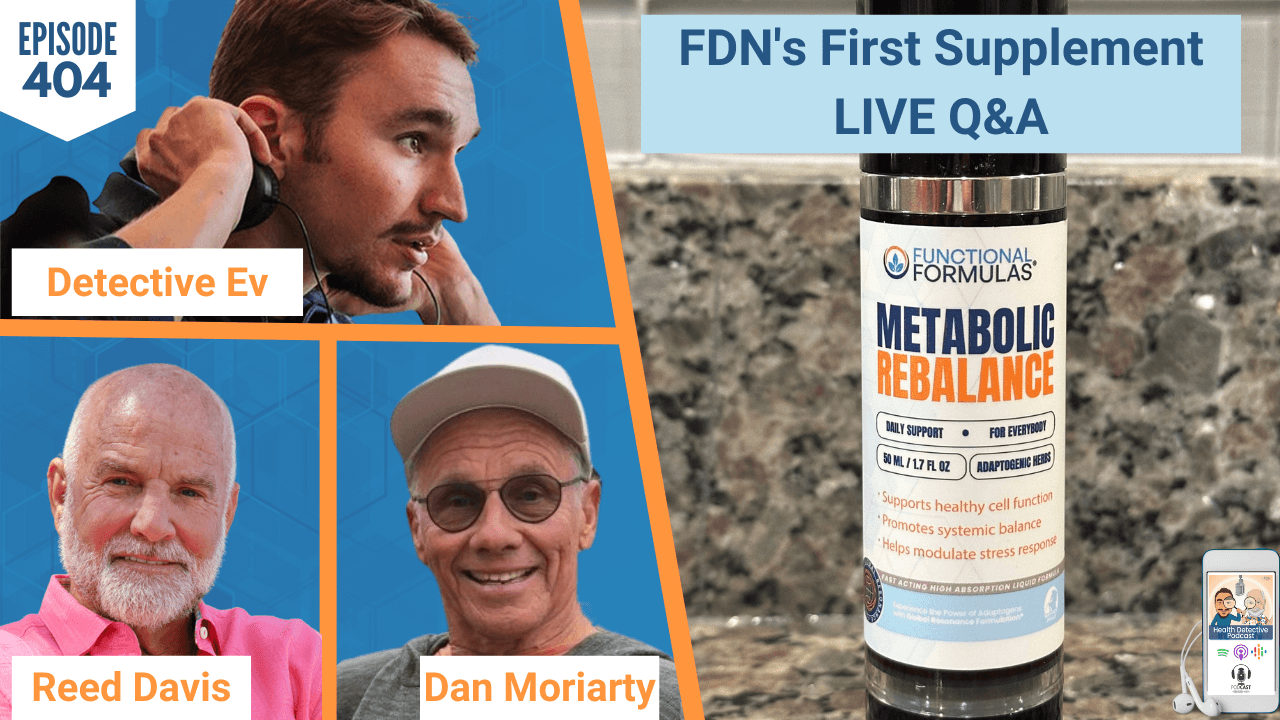Introduction
[00:00:00] Detective Ev: What is going on my friends? Welcome back to another episode of the Health Detective Podcast by Functional Diagnostic Nutrition. My name is Evan Transue, AKA Detective Ev. I will be your host for today’s show. We are talking about a topic today with someone known as The Kegel Queen, that I never even thought we would discuss on this show. It’s certainly different, especially interesting for a 26-year-old male to be interviewing someone on. It is conceptually similar to a lot of things we talk about on this podcast.
The person we’re interviewing today is Alyce Adams, she’s an RN by trade. She had a health issue she could not get supported properly by conventional means even being a part of conventional medicine herself to a degree. She had to go out and become her own detective. She had to seek out alternative information and alternative practices to really learn how to get her issue under control.

The issue that we’re talking about today is not autoimmunity or cancer. This is where it differs a little bit from what we normally talk about. We are going to be discussing urinary incontinence and vaginal prolapse. Not really what I signed up for when I first started this podcast, but t’s a very important topic.
It’s something that needs to be said and Alyce knows her stuff. She actually is nicknamed the Kegel Queen. If you don’t know what those are, they’re actually exercises that both men and women can do to strengthen the pelvic floor. I’m probably giving an overly simplistic definition of this. It’s more than that and Alyce talks about this in the show. She nails it.
An Important Topic that Needs to Be Discussed
Now, why would we bring this on? Well, we know what our audience is. It is predominantly women. That’s just, unfortunately, who’s in the functional space. Not that there’s something wrong with women in the functional space.
I just mean that it’s kind of sad that there’s only a small percentage of men comparatively speaking in this space. It’s tough because women will go forever knowing they feel like crud and then will finally get help. Then I feel like men are just so unaware that they even feel like crud that eventually one day they wake up and realize, oh, I feel terrible, and I just had like a heart attack or something. There’s really some crazy stuff that both sides do with this.
I wish we had more men in the space. But since we know our audience and we know it is predominantly women, especially women that aren’t teenagers that’s for sure. I’d say between 35 and 55, generally speaking, although it goes all over the spectrum. These are issues that absolutely affect our demographic and Alyce Adams nails it.
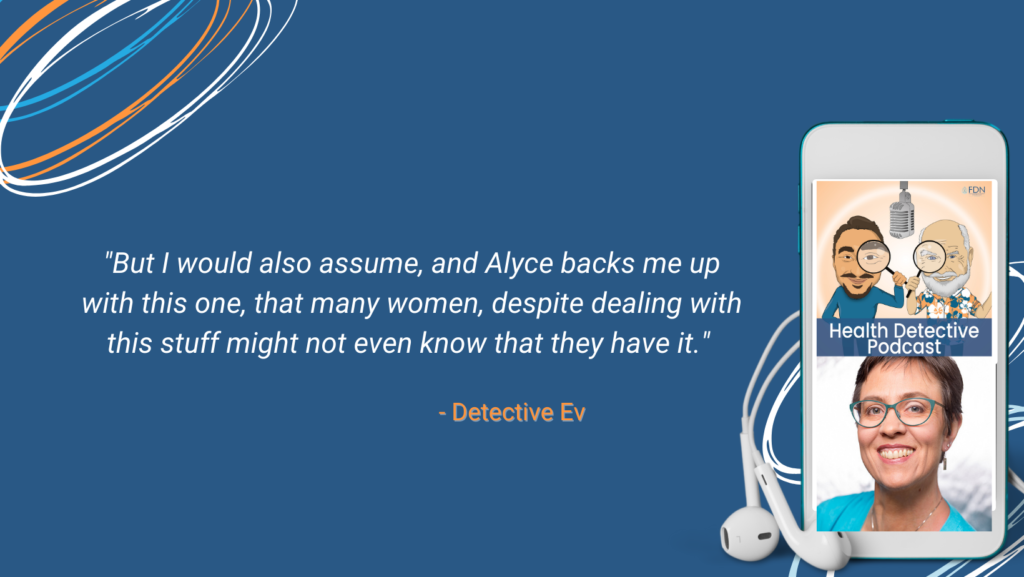
I think even though it’s not really us talking about FDN today or functional lab testing, it’s a good change of pace for people that are regular listeners. Some people reach out to us and say they listen to every single episode. I feel like this is a nice, refreshing change of pace. I have never even heard about some of this stuff. I had no idea what was going on here. Grant you, yes, I’m a 26-year-old male. But I would also assume, and Alyce backs me up with this one, that many women, despite dealing with this stuff might not even know that they have it.
There’s Risk Factors to This
It’s one of those perfect storms in this world where she talks about in the podcast. You don’t necessarily know that you have these problems. You know something’s off; you might confuse common with normal. How funny is this? Because we always say this in the functional space, that common is not normal.

She used those exact words with these issues that we’re gonna talk about today. Some people don’t even realize that they’re dealing with something because their friend might have had it and said something or made a joke about it. So, they’re like, oh yeah, it’s fine. But this is actually something that has risk factors to it. Going on long enough could lead to other complications so we gotta get this stuff under control. We have to bring awareness to it. We gotta know what to do and what to do is actually fairly simple.
Alyce talks about it in this show, but no one is discussing it. She had to go through years and years of research to actually figure out how to do this simply instead of going the first route that Western medicine wants to go, which at the time of recording this is surgery. Her method does not involve surgery at all, I’ll tell you that.
What’s cool about her is she’s not dogmatic about it. She knows that at certain points, if someone was too late in the game, perhaps yes, surgery is appropriate, needed, and absolutely recommended. But what she thinks is that way too many people are getting this recommendation as a first resort when there are years and years and years and years of things that they could be doing to avoid that surgery.
A Little Bit About The Kegel Queen
When I say years and years and years, I mean that they have that amount of time, not that it would take that long. She thinks it only takes about a few months; some people maybe several. If you’re dealing with these issues or you relate to what we’re talking about today, I think you’ll understand why a few months is a worthy tradeoff for the alternatives.
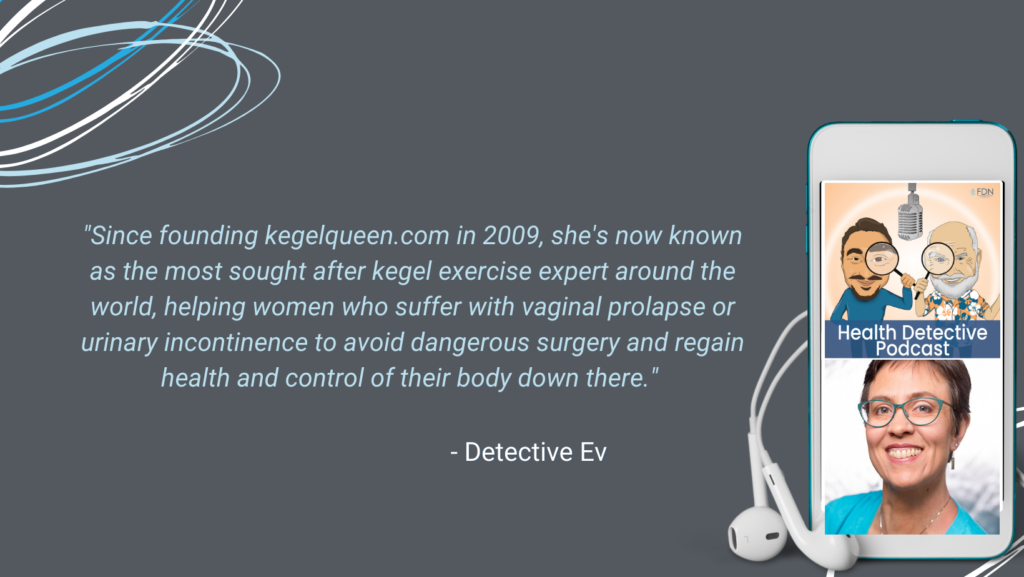
So, a little bit about Alyce’s professional background, she is an RN, and she’s also known as The Kegel Queen. Since founding kegelqueen.com in 2009, she’s now known as the most sought after kegel exercise expert around the world, helping women who suffer with vaginal prolapse or urinary incontinence to avoid dangerous surgery and regain health and control of their body down there.
She’s famous for creating the Kegel Success in Minutes a Day program, the only complete, no devices, safe at home kegel exercise program created and tested by an RN. The Kegel Queen program has reached over 3,011 women in 27 countries. Pretty darn cool, man. Alyce has shared her kegel expertise as a guest blogger for the American College of Nurse Midwives and a guest lecturer at Bastyr University in Seattle and the University of Rochester in New York. Most recently she has consulted with the Stanford Biodesign Fellowship at Stanford University in California.
All right, well, this woman is killing it, man. With that all said, we hope you enjoy this change of pace for the podcast, at least for this episode.
FDN, Helping You Make an Informed Decision
Now in the world of FDN really quick. If you’re listening to this within the first couple of days of it coming out, you are in the last few days of the FDN Summer Open House.
This is where we did exclusive events, stuff we’ve never done before in all 14 years of the course being around. We’ve actually allowed people from the public to directly come in and see what goes on as a trainee, what goes on as a graduate, things that people only get to see if they’re in those positions. There are things with the founder of FDN, Reed Davis.
And in fact, if you’re listening to this at the time that it came out, you still have a couple of days. Because on June 28th, he will be doing a Q&A. Then he and I will be going live one more time on Instagram and Facebook on June 30th. So go to fdntraining.com/summer to get all of the updates for that.
That’s fdntraining.com/summer for all the updates.

The price of the course is gonna go up $1,000 July 1st, 2022, to match the improvements to the course that have occurred over the last couple of years. We have done everything we possibly can this month to advertise this, share this with people, and allow them to make an informed decision.
An Entire Month of Warning & Advertisements
I know that they’re a very nice team over at the course enrollment side. I’m gonna guess they’re not gonna be too lenient with giving people a break on the thousand dollars since we gave an entire month of warning and additional advertisements for it. So, if you’re on the fence about the course, please consider looking into this.
And if you’re someone that’s brand new, the last thing we ever wanna do is be pushy about this. It’s totally worth the thousand dollars increase regardless. So, take your time, make an informed decision. Make sure that the course is actually right for you. For some people, this can take several weeks or even a couple of months, that’s totally fair. Then jump into the course if you find that it’s right.
So that’s, fdntraining.com/summer if you would like to check that out.
With that all said, I think it’s time for the show.
This Topic is Natural Health at its Finest
Without further ado, let’s get to the interview.
All right. Hello there, Alyce. Welcome to the Health Detective Podcast. Thanks for being here.
[00:07:40] Alyce Adams: Thank you, Evan. I am delighted to be talking to you today.
[00:07:44] Detective Ev: I think the audience is going to like this one. It’s been talked about as being refreshing in the past where we switch it up a little bit. At the time that this is released, it’ll be episode153. There’s been quite a lot of content and it never gets old hearing these amazing stories in the functional health space where people have overcome cancer, autoimmunity or whatever. But I find that you guys really respond super positively when we dose in other things that are health related.
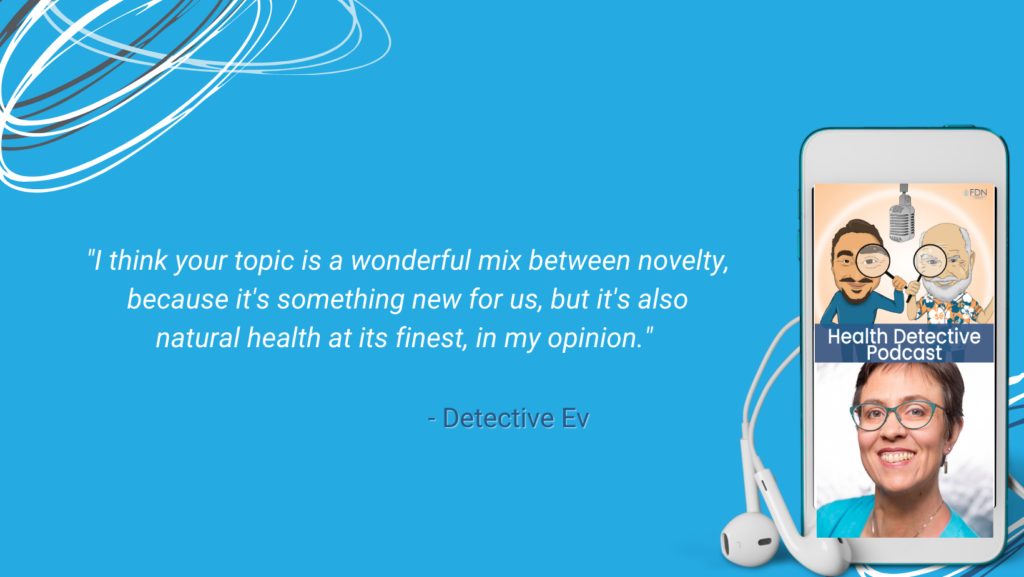
It’s not like it’s irrelevant, but it’s not the same thing as, I went through this crazy experience and here’s how I figured it out functionally. There are many other aspects. Alyce, we brought on coaches before that help with the mindset stuff, we’ve brought on, not religious, but more like spiritually oriented people. Like, how do we find purpose in life and stuff like that. I think your topic is a wonderful mix between novelty, because it’s something new for us, but it’s also natural health at its finest, in my opinion.
You have an interesting title that you go by that I already mentioned in the intro. I usually start off this show by asking what symptoms did they deal with or what health stuff did they deal with? I’m not sure if you dealt with it directly. So, let’s start here. How the heck did you get into this work? What inspired you to do that?
Sneeze Pee – Stress Urinary Incontinence
[00:08:57] Alyce Adams: I’ve been involved with women’s health, my entire adult life. When I was 17, I had this idea that maybe I wanted to be a midwife. I didn’t really know why, but that was kind of the first inkling of it. Then I went on through my twenties. I worked as a doula, a childbirth doula, like an assistant and a childbirth educator. I trained as an herbalist. I was all working up to becoming a midwife.
I went to school in New York state, where I live. The legal way to be a midwife is to be a nurse first. So, I went to nursing school. I got all the way through that. I was halfway through my master’s degree, working on midwifery and I was delighted to become pregnant. I did a 180, left school, and having my daughter (she’ll be 18 next week), having her was the best thing that ever happened to me, but not the best thing that ever happened to my body.
I had during my pregnancy and then after she was born, I had sneeze pee, which I’m sure many of your listeners are familiar with.
[00:10:09] Detective Ev: I’ve never had it. I don’t think it takes a genius to figure out what that is. And that does not sound fun.

[00:10:13] Alyce Adams: No, it’s not fun. Sneeze pee for me was like a minor thing. Like, oh, I better change my underwear. I mean, there are women though, many, many, many women who have sneeze pee or coughing or laughing or lifting pee. That whole phenomenon is called stress urinary incontinence. There are a couple different kinds of urinary incontinence, so that’s stress incontinence.
Pelvic Organ Prolapse – Organs Shifting Down
I had a friend once who was telling me she was at her kids’ sports event. She yelled and she’s like soaked.
Detective Ev: Oh geez.
Alyce Adams: So, it can be a really serious problem.
Anyway, for me, I had sneeze pee. I had signs that I didn’t even know were classic textbook signs of a prolapsed bladder. That’s another whole topic we’re gonna detour into what is prolapse, because I’m sure many of your listeners are unfamiliar with that.
The crazy thing about prolapse too, is that I was, even after all those years of women’s health and all my nursing training and everything, I barely knew what it was. I didn’t even know until later when I started doing this intensive research about the pelvic floor and kegel exercises, it was only then that I was like, oh man, those are the feelings I’m having.
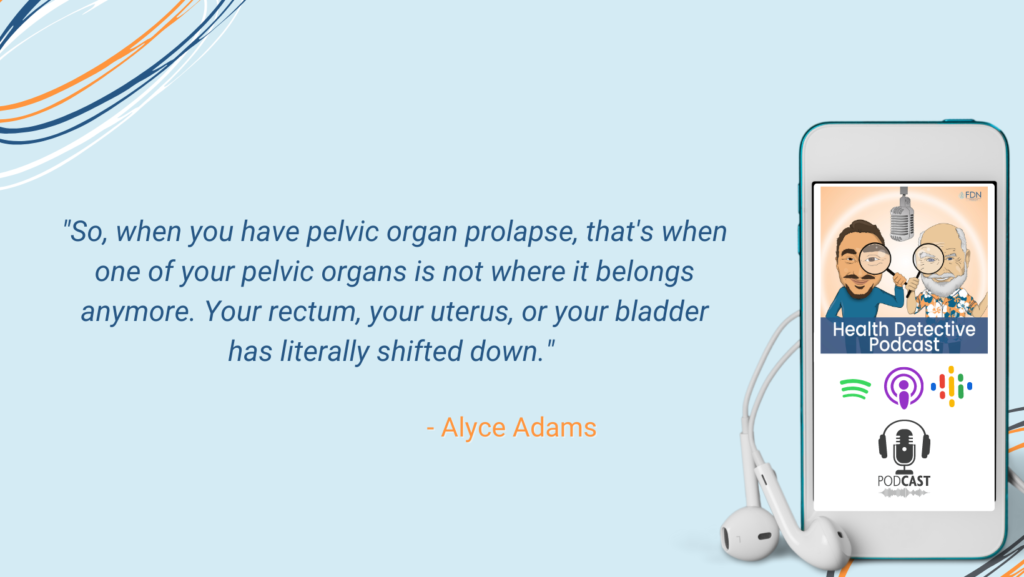
Long story short about prolapse. The word prolapse just means something in the body has shifted out of its proper position. So, when you have pelvic organ prolapse, that’s when one of your pelvic organs is not where it belongs anymore. Your rectum, your uterus, or your bladder has literally shifted down. It’s like fallen out of its proper place. I had these symptoms; I didn’t really know what it was. I was like, things don’t feel the same down there, but maybe that’s just what being a mom is. I don’t know.
Then the other thing that was a problem for me was sex wasn’t the same. I knew it, when I heard it was not the same for my husband, it totally freaked me out.
Searching For What Really Works
That’s what really pushed me over the edge to take action. I was like, okay, something isn’t right with me. Like my anatomy isn’t functioning the same way as it was before. And how am I gonna fix it?
The way to fix pelvic floor, I’m like, okay, you do kegels, right? How do you actually do them? I’ve heard some things. Like what actually works?

I started trying to figure out what actually works. Every piece of information I found was total garbage. There are magazines with crappy magazine information. There’s like one website that disagrees with the next one. Even places like the Mayo Clinic. They’ve changed their website since those days when I was looking at it back years and years ago, but they’ve actually made their information worse. I mean, it’s not really information.
The amount of instruction you get from the Mayo Clinic, it’s like, if you were 16, and you wanna learn how to drive a car. The instructions were, well you sit in the driver’s seat and put your hands on the steering wheel and drive the car. It’s just not enough.
Detective Ev: Would not end well.
Alyce Adams: Yeah. So, all the information that I was finding and even talking to other nurses, people are like, I don’t know. I just couldn’t find anything that was real and that seemed like it was actually based on facts. I thought, okay, I’m kind of a nerd, I’m a nurse. I’m gonna go research this.
I spent a year. I would drop my daughter off at preschool, which was conveniently located right down the road from the Medical Library at University of Rochester. Which is really good, for conventional medicine, it’s right up there.
How The Kegel Queen Was Born
I just camped out in the library. I read hundreds and hundreds and hundreds of pages of material about what protocols actually work, and how do you do exercise in a way that actually sticks? You know, how do you make this work? Because I was a busy mom with a kid, and I had a life. So, I read all this stuff.
I synthesized the best, most effective techniques. I started doing it and two months later, everything changed for me. The sneeze pee went away. The saggy yucky feelings that I now know were related to prolapse went away and sex totally changed. That was a miraculous thing to experience.
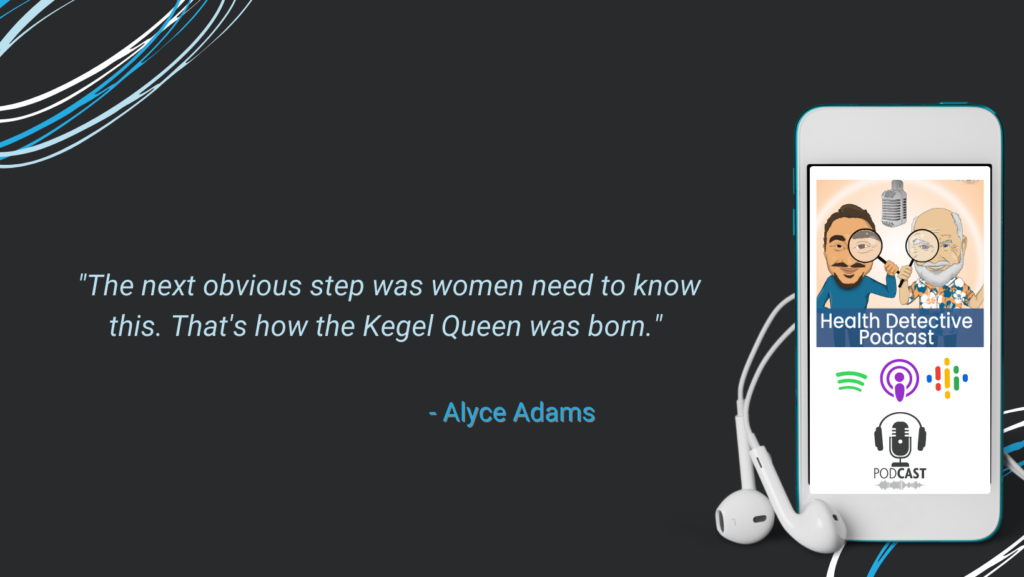
The next obvious step was women need to know this. That’s how the Kegel Queen was born.
[00:14:55] Detective Ev: Wow. Okay. First of all, I’m sure you do this all the time, but still, I really respect the transparency and vulnerability with the topic that most people are not comfortable with. That’s probably why there was such, and still to this day, such crap information out there. Because if no one’s really talking about it, where are you gonna get this stuff from?
It’s uncomfortable to go talk to a doctor about these things, let alone your friend or some blog person on the internet or whatever. I think it’s actually really, really important. And you know what, Alyce, we were talking before we got on as, oh, maybe this isn’t exactly like these normal podcasts. But in a sense, it is, but it has a lot of novelty to it.
An Alarming Statistic with This in the U.S.
I mean, conceptually speaking, you had a health challenge. You really couldn’t figure out how to work with this in a normal way. So, you had to go find your own stuff. You had to become your own health detective. That’s why we’re called the Health Detective Podcast. You’re actually perfectly in alignment with this, with an issue that has never even been, no one has ever even listed this off as one of their issues in 160 episodes, let alone done an episode on it. I think this is cool.
Now my next obvious question is are there stats that you would know of with how many people, women, I guess, deal with this? Because I’m going to guess there are many that were in this phase, like you, that have the sneeze pee thing or something else. Maybe sex isn’t as fulfilling as it was before, but they don’t realize that something is actually wrong. I don’t even know how we would estimate this, but what is this supposed to be?
[00:16:14] Alyce Adams: There are so many things I wanna say about that, that I’m going to make a quick note. The most alarming statistic, Evan, is that in the United States, maybe I’ll put you on the spot and ask you to guess. Women have surgery to address vaginal prolapse and urinary incontinence. By the time a woman is 80 years old in the United States, what are her odds of having that surgery, not just having the problem, but having the surgery, one in how many?
[00:16:47] Detective Ev: One in 10.
Alyce Adams: One in five.

Detective Ev: Wow! Okay. And I thought I was going high. I’m like, she’s tricking me. It’s gonna be higher than I think. And of course, it’s even higher.
Breaking the Shame and Silence
[00:16:56] Alyce Adams: Exactly. It’s insane. This is a rampant problem. Better than 50% of women have some kind of pelvic floor issue. One of the problems, there are so many issues with it that the way we respond to it is just completely backwards.
For one thing, women feel this incredible shame, I experienced that myself. I mean, you know my background before I ever had my daughter and before any of this stuff was going on with me, I was already talking to women about their vaginas. You know, it wasn’t I had reluctance to discuss issues like this. But when it was happening to me, like the fact that sex wasn’t the same, I didn’t talk about it to anybody.
I didn’t talk about it to my friends. I didn’t talk about it to my sisters. It was like, I felt this incredible shame. What I’ve noticed, I mean, notice makes it sound so light, but working with women all these years, what I see over and over and over again, is this incredible emotional impact of something being wrong down there.
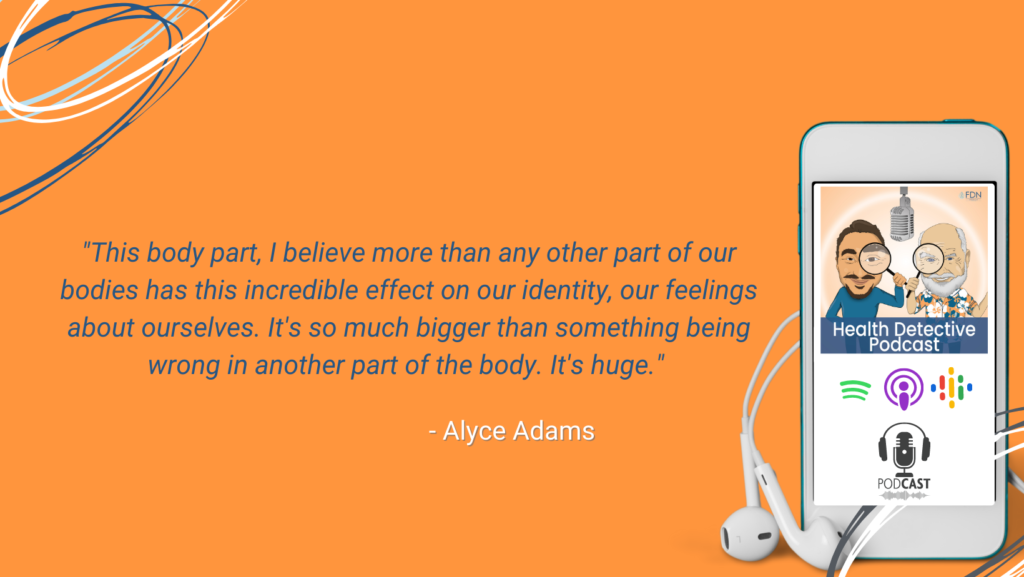
This body part, I believe more than any other part of our bodies has this incredible effect on our identity, our feelings about ourselves. It’s so much bigger than something being wrong in another part of the body. It’s huge. I have so many women come into my program and say, like, I haven’t talked to anybody about this. I haven’t been to my doctor. I really think breaking that shame and that silence is super, super important.
Surgery is Not the Only Option
Another piece is if you have urinary incontinence and you’ve already had a baby, or you are over 50, you probably think it’s quote/unquote “normal.” Women, it’s so prominent that it’s kind of like this little joke, like, oh, ha ha ha. You know, everybody loses little pee, whatever. It’s not normal. It’s common. That doesn’t mean it’s normal.
I think so often women don’t look for help because they just figure, that’s just how it is, same way you expect that after 50, you’re gonna have crow’s feet around your eyes or whatever. Not that I necessarily buy that either.
But people think, women think, that this is just a normal part of being a mom or it’s just part of getting older and that’s BS. Then compound that with the way conventional healthcare responds to these things, which is worse than useless. Prolapse in particular.
You know, we’re preaching to the choir here. If something’s wrong with you, whatever it is, something’s going on with your health (this is something even conventional medicine allegedly follows this principle, allegedly), but you always start with the treatment that’s likely to work that’s the least likely to have a negative effect. The safest treatment that’s likely to work.

So, gee, what’s the deal with prolapse? Well, what happens when a woman brings this to the doctor is we need to do surgery. That’s literally the one and only thing almost everyone hears from their doctor is the only option is surgery. It’s not true. It’s not true at all. And that we would subject women to not only that surgery being the first thing on offer, but the only thing on offer, it’s just insane. So, if women know about it at all, understandably, they’re reluctant to go look for help.
The Information Gap (and Misinformation) About Kegels
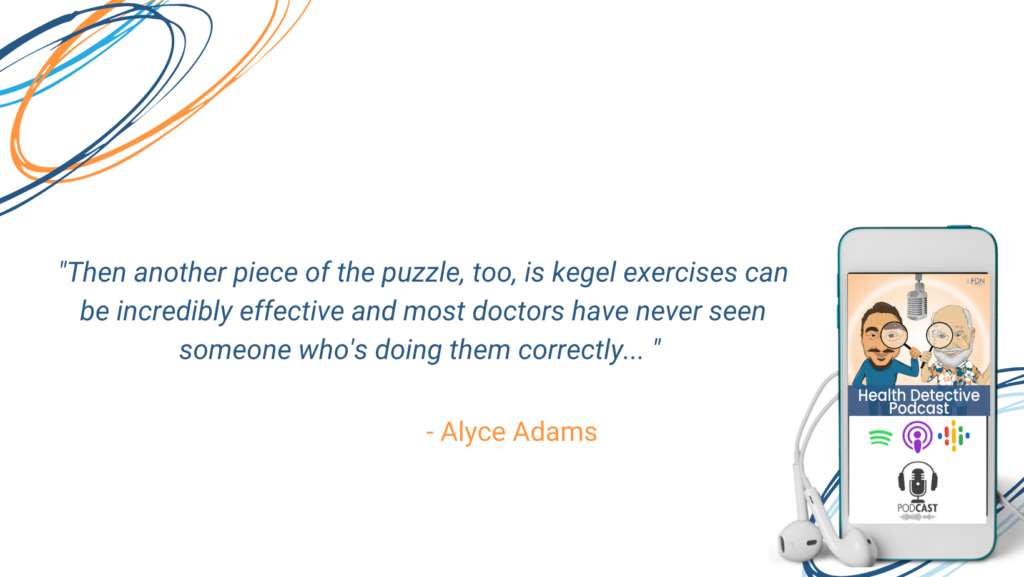
Then another piece of the puzzle, too, is kegel exercises can be incredibly effective and most doctors have never seen someone who’s doing them correctly, because of this information gap and not only information gap, but misinformation in the popular culture and in conventional dialogue about kegels.
I’m guessing that your listeners have probably heard things like do kegels every time you get to a red light or when you’re waiting in line somewhere or do 200 kegels a day.
[00:21:33] Detective Ev: I’ve even heard stuff like that. So probably yeah.
[00:21:36] Alyce Adams: Or you need a device. You know, you gotta buy something to put in your vagina and it’s got like lights and talks to your cell phone. Like, it’s not real.
[00:21:49] Detective Ev: Okay. I wanna obviously talk about the kegels and stuff like that and the techniques and all of that. That’s important. It’s one of the main points of the show. But this is bringing light to a topic, honestly, in a very similar way to what we normally do on here, but it’s so unique we’ve never talked about it.
That’s why I wanna really dissect it for a second. Is this one of those things where someone can just go on indefinitely with these problems? Are there risk of complications or would you just go your whole life, basically suboptimal, there would never be any real complications? Or at worst can this end in a pretty bad way?
The Problems Kegels Address
[00:22:22] Alyce Adams: Let’s look at the three problems that kegels address. Sex, obviously, if you have suboptimal sex, you can live like that. You know, it’s not gonna turn into a major health problem.
With prolapse, it can get bad, especially if you don’t know what to do to minimize worsening it. There are lifestyle things you can do but prolapse can get bad, meaning that either the uterus, most of the uterus, or either the bladder, or the rectum covered by the vaginal wall, you can have kind of a large bulge outside the vagina. That could be disruptive to your life. Generally, you’re not looking at like, you’re gonna start having infections or not a lot of complications necessarily, but a big quality of life hit if it’s severe and unaddressed.
The big complications that can happen with prolapse would be that it’s hard to move your bowels or that it’s hard to empty your bladder fully. So, you can be at risk for bowel issues resulting from constipation, and you can be at risk for things, depending on which organs you’re talking about that are outta place.
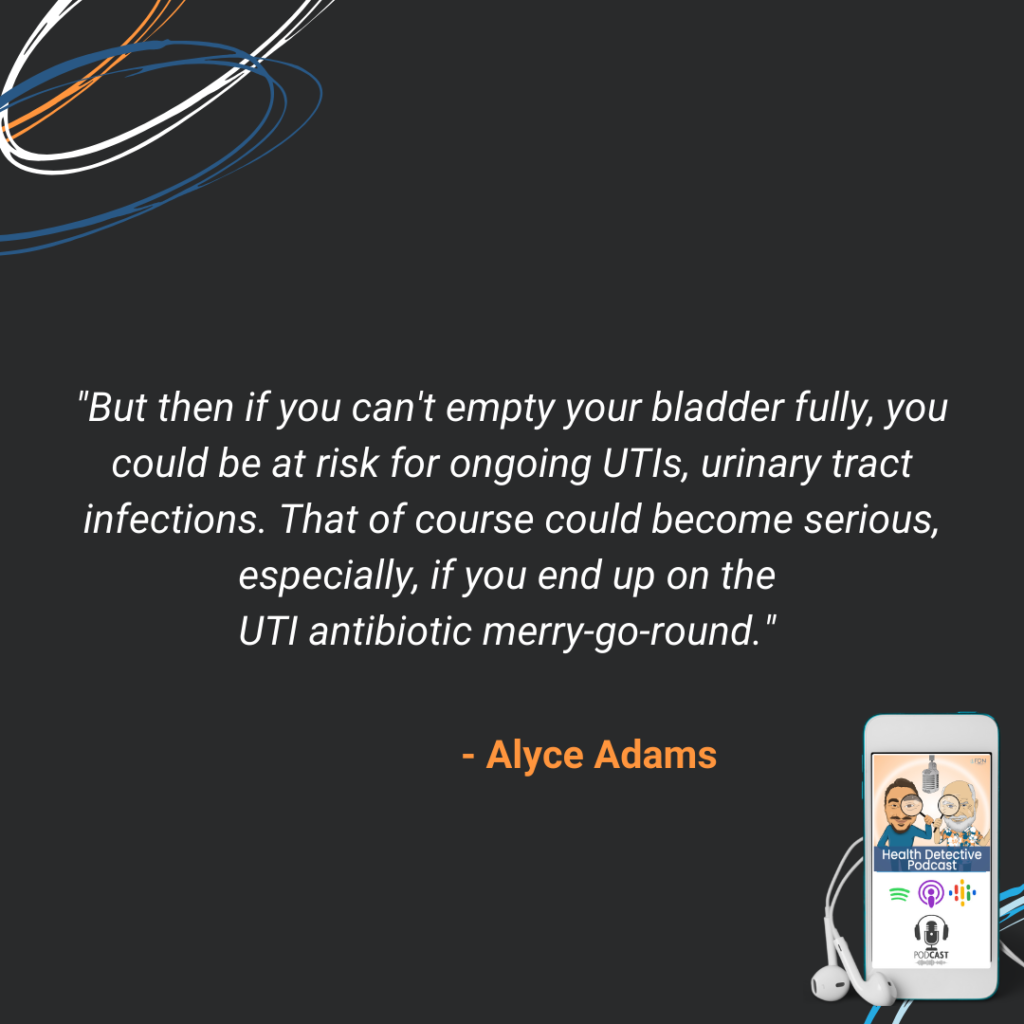
But then if you can’t empty your bladder fully, you could be at risk for ongoing UTIs, urinary tract infections. That of course could become serious, especially, if you end up on the UTI antibiotic merry-go-round. Then there’s dominoes fall from that. So, directly from the prolapse, not so much.
Then with incontinence where you can end up with a problem is for women who try to avoid incontinence by staying dehydrated, that can provide a lot of problems.
Unhealthy Choices Dealing with Incontinence
Also, for women, what happens a lot of the time is if it’s severe, women change their life in order to avoid being away from a bathroom. They stay home, they avoid social activities, they avoid exercise. Think about, let’s list some of our favorite top things that are good for our health. Fortunately incontinence isn’t gonna necessarily affect sleep. Women don’t usually try to avoid sleeping for it. But staying hydrated, exercise, and having a healthy, active social life, these are all things that are basic foundational supports for our life.
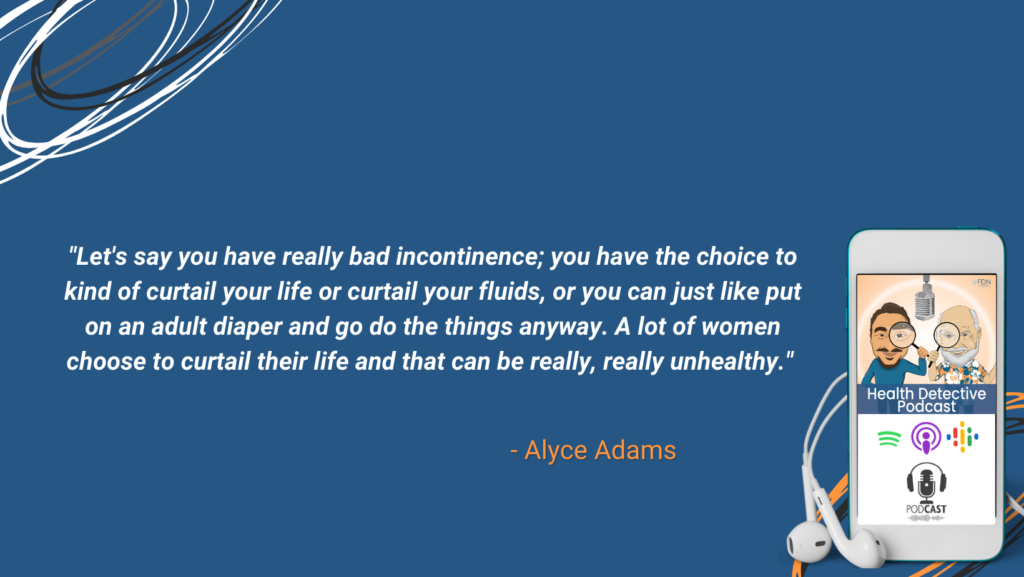
Let’s say you have really bad incontinence; you have the choice to kind of curtail your life or curtail your fluids, or you can just like put on an adult diaper and go do the things anyway. A lot of women choose to curtail their life and that can be really, really unhealthy. Then of course, addressing the incontinence is another option that we didn’t even mention.
[00:25:10] Detective Ev: This is one of those problems, I know I’ve said it multiple times, but it’s just so hidden that there’s so many things I wouldn’t even have thought of. I didn’t realize that there’s people out there, cause it sounds like the way you just said that there’s plenty that are dehydrating themselves so that they don’t have this stuff. And of course, that’s not a good thing to be doing for even a day, let alone chronically. I mean, wow.
[00:25:30] Alyce Adams: Absolutely. I’m curious to know how many women end up with kidney issues because they have chronic dehydration.
Needing to Take This Seriously
When you’re older, you’re more at risk for problems resulting from all of those things. So, imagine all of those things, social isolation, not exercising, and dehydration compounded by aging. Which kind of puts you at risk for all those things in the first place or makes the outcomes of those things more dangerous.
[00:25:59] Detective Ev: This is the reason I had asked the question about what are maybe some of the risk factors here? Because even though it might take some time, or it might not be a huge issue until we get older, I’m not trying to scare anyone, but I also want them to take it seriously.
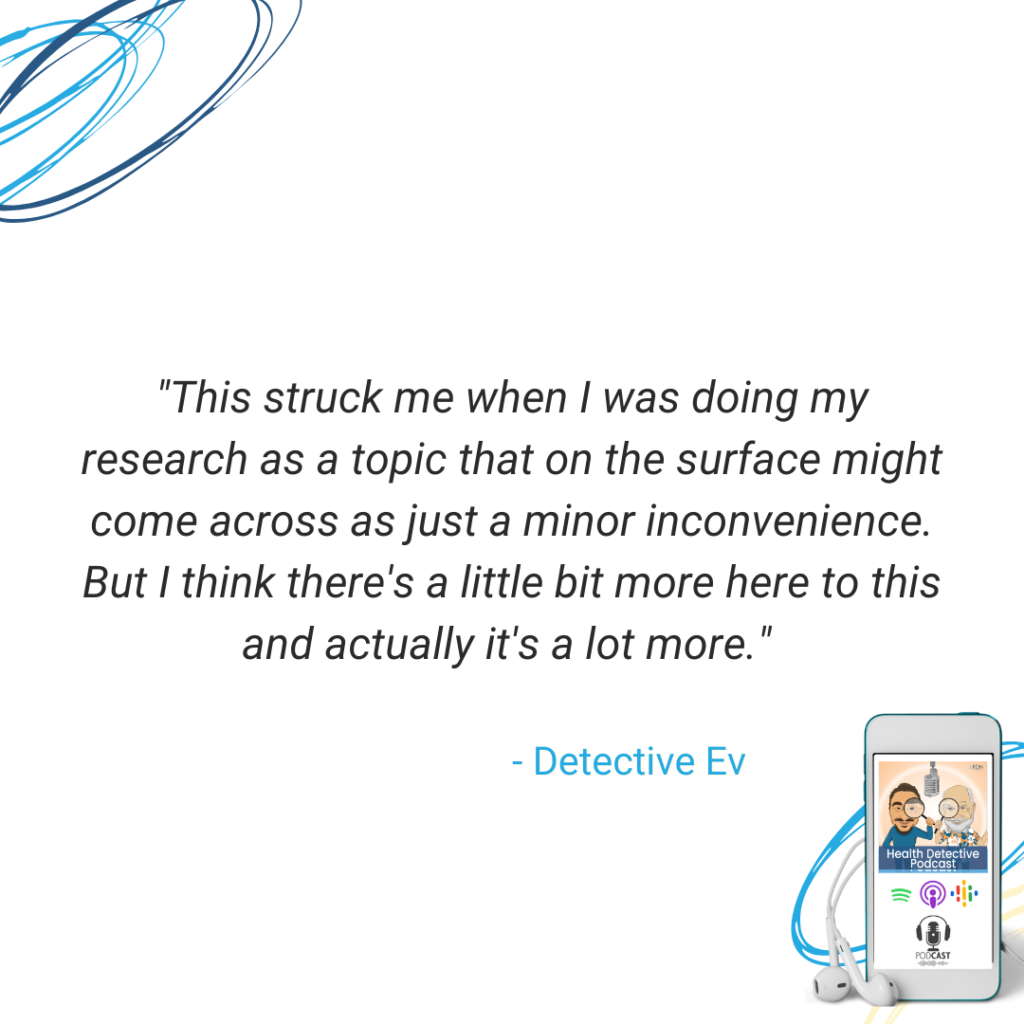
This struck me when I was doing my research as a topic that on the surface might come across as just a minor inconvenience. But I think there’s a little bit more here to this and actually it’s a lot more. Is that the most extreme? Yeah, this could lead to some really serious problems. And just because we hear something on a podcast, even if it’s by someone who’s extremely professional, clearly educated on the subject, that doesn’t mean we’re necessarily gonna go do it.
I think sometimes, I could be projecting, cause it worked for me with my things. Sometimes it’s okay to have a healthy dose of like, oh, wait a second. Like, you know what, maybe I should be worried about this. Again, not stressing out all day, but just a little bit so that you take the appropriate action. Because you’re talking about in two months, you were starting to feel better. That’s not that long of a time, right? So it’s not like they have to do this for 3, 4, 5 years necessarily.
The Goal is For Better Toned Pelvic Muscles
[00:26:58] Alyce Adams: No. Oh gosh, no.
I mean, it can be months, you know, particularly with prolapse. The thing is too with kegels, there’s a different learning curve for different women. So, for some women they might have already identified the muscles. They’re familiar with the basic movement of how to contract and release those muscles. They’re gonna have a leg up over someone who has never heard of those muscles, has never experimented with them, is emotionally cut off from that whole region of her body, maybe has trauma and needs to kind of reconnect. It can take a while to get to the same level of just simply moving the muscles.
Then a lot of what helps with prolapse has to do with creating hypertrophy in the muscles. This is a technical audience. I can use that word, right?
Detective Ev: Yes.
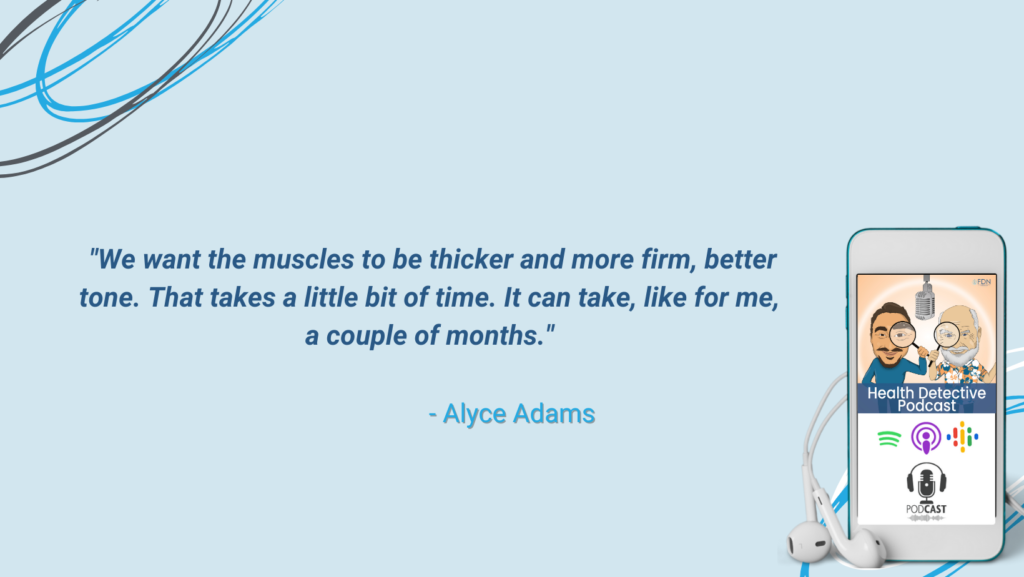
Alyce Adams: So, just in case somebody else is listening. We want the muscles to be thicker and more firm, better tone. That takes a little bit of time. It can take, like for me, a couple of months. I have women, I say, as long as you’re not doing anything that is undermining your progress, I want you to give it a solid six months before you reach a conclusion about how much kegels are gonna do for you.
[00:28:25] Detective Ev: I think it’s probably about time to talk about like what those even are, and we’ll define them. Alyce, I wanna be very vague about this, but I know that he wouldn’t mind overall me sharing the concept cause it’s important. You had already said that by the age of 81, 5 women are going to have surgery for this.
Things That Continue to Hide This Problem
I know as someone who’s a health professional and you know, just as well, even if some people are willing to talk about an issue, some people refuse surgery. There are religious beliefs around that. There are certain people that just, you know, maybe there are so far in life that they’re like, I don’t want to go through that. I just wanna live my life and do whatever.
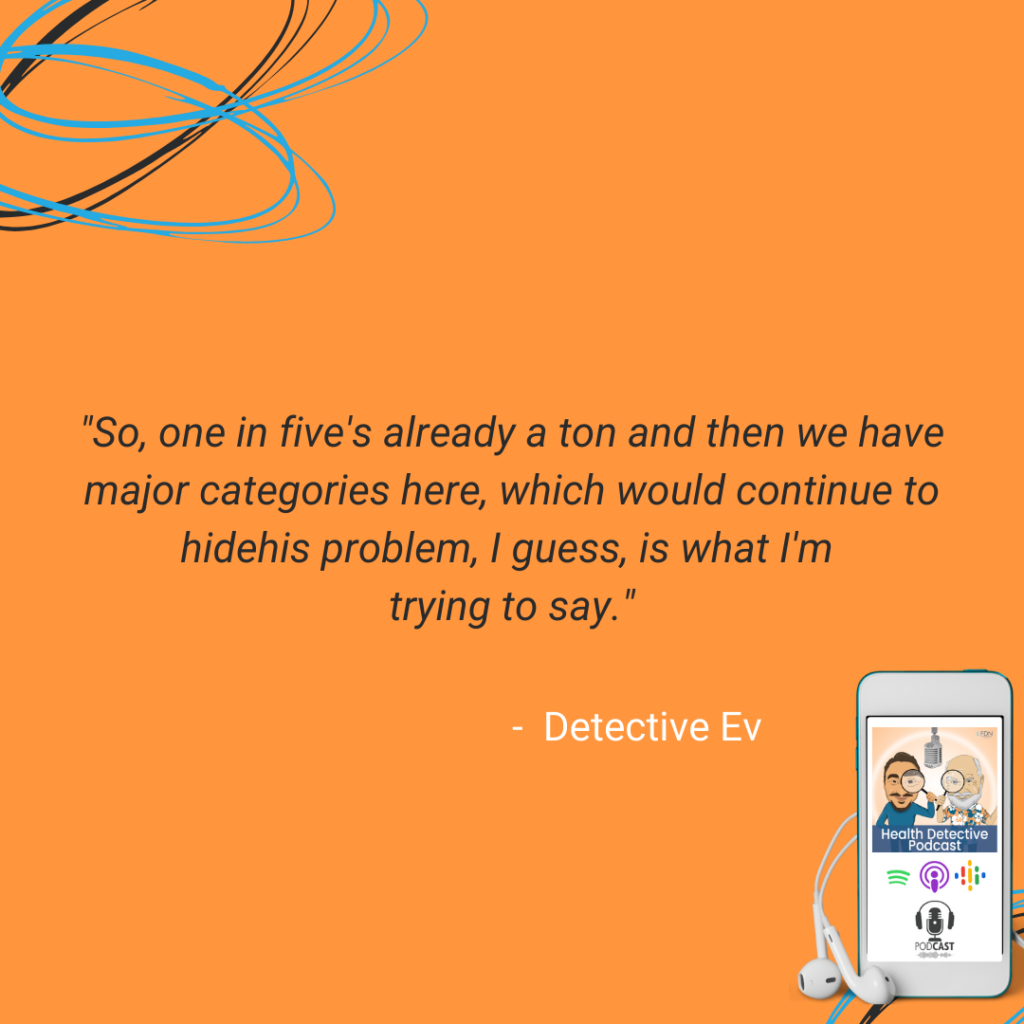
So, you have the surgery aspect there and then you have the awareness. Maybe they don’t even realize something’s wrong. And then there’s the embarrassment category. I do realize something’s wrong. I’m not dead yet though. So, I’m not gonna do anything about it. There are three obvious categories already that are skewing those stats in a way that makes it seem that more or less people are doing it than actually are. I hope I said that right. You know what I mean? So, one in five’s already a ton and then we have major categories here, which would continue to hide this problem, I guess, is what I’m trying to say.
But this is also something that even though it’s a little different of an exercise, this is something that men can learn from.
I have a friend, I’ll just put it that way. He’s a younger guy like myself, and he had an injury of sorts, Alyce, that led to very painful urinations, inability to control that. This shocked him, right? I mean, we’re talking a year plus of physical therapy and he was doing these exercises for males.
Men Deal with Some of This Stuff Too
He talks to me about this stuff because he knows, one, I’m never gonna judge someone for health issues. I get this, like, I’m very public about my stuff. You can talk to me about anything. And two, I’m the only person who even gets what he’s talking about to begin with. Right? So, you have awkward and confused if you talk to the average person. At least I’ll listen.
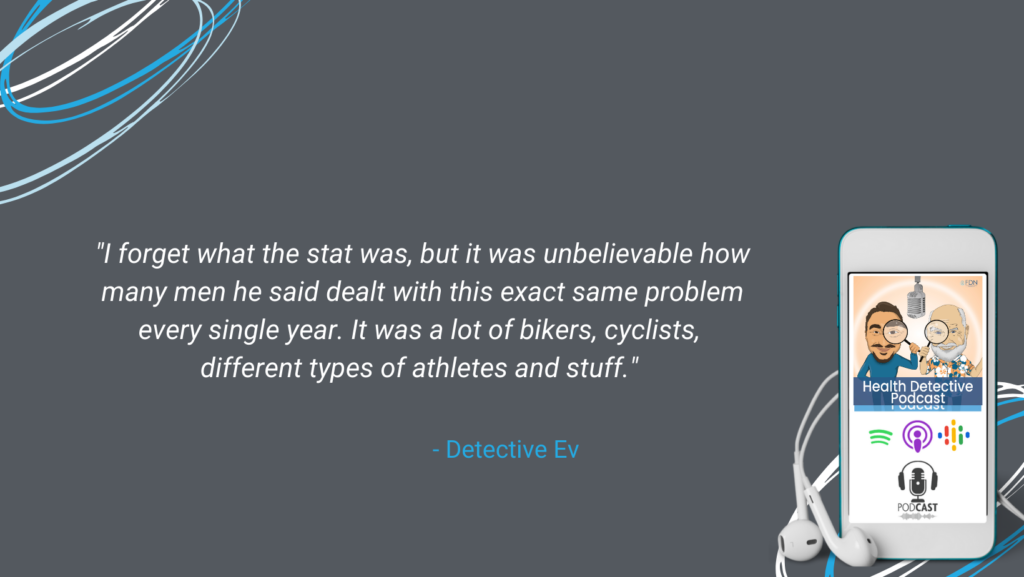
I forget what the stat was, but it was unbelievable how many men he said dealt with this exact same problem every single year. It was a lot of bikers, cyclists, different types of athletes and stuff. It was well over 10% and you never hear about it. It was the first time I had ever heard about it.
So, I know that we’re here to talk about the women today, but just for men listening in the audience, this is exercises that you can do in your own way. Do your research.
I don’t know if you have any places that they can go or if you are a one stop shop for that. But I just wanted to preface all of that before we started talking about the exercises themselves because there’s a lot of people that deal with this.
[00:30:38] Alyce Adams: Absolutely.
I haven’t done research about men. I don’t have a program for men, and I unfortunately don’t have a place I’d love to send men. I wish I did. Someday, I’m gonna partner with some brilliant guy and he can be the Kegel King. We’ll figure it out. So far though, my specialty is women. I don’t have anything to say about technique for men cause I’d wanna be accurate and precise about it if I did.
Men Don’t Get the Same Support as Women Do with This
[00:31:07] Detective Ev: I respect that even more, to be honest.
[00:31:08] Alyce Adams: But what really strikes me about what you said again is the shame. Holy cow! And if it’s bad, I mean, imagine. Let’s say that, you know, I’m 52, let’s say that I’m a 50-year-old woman and I have sneeze pee and I’m a mom. I have sneeze pee, but so do all my friends and we kind of joke about it and it’s like normalized. You know, I still feel ashamed, and it sucks.
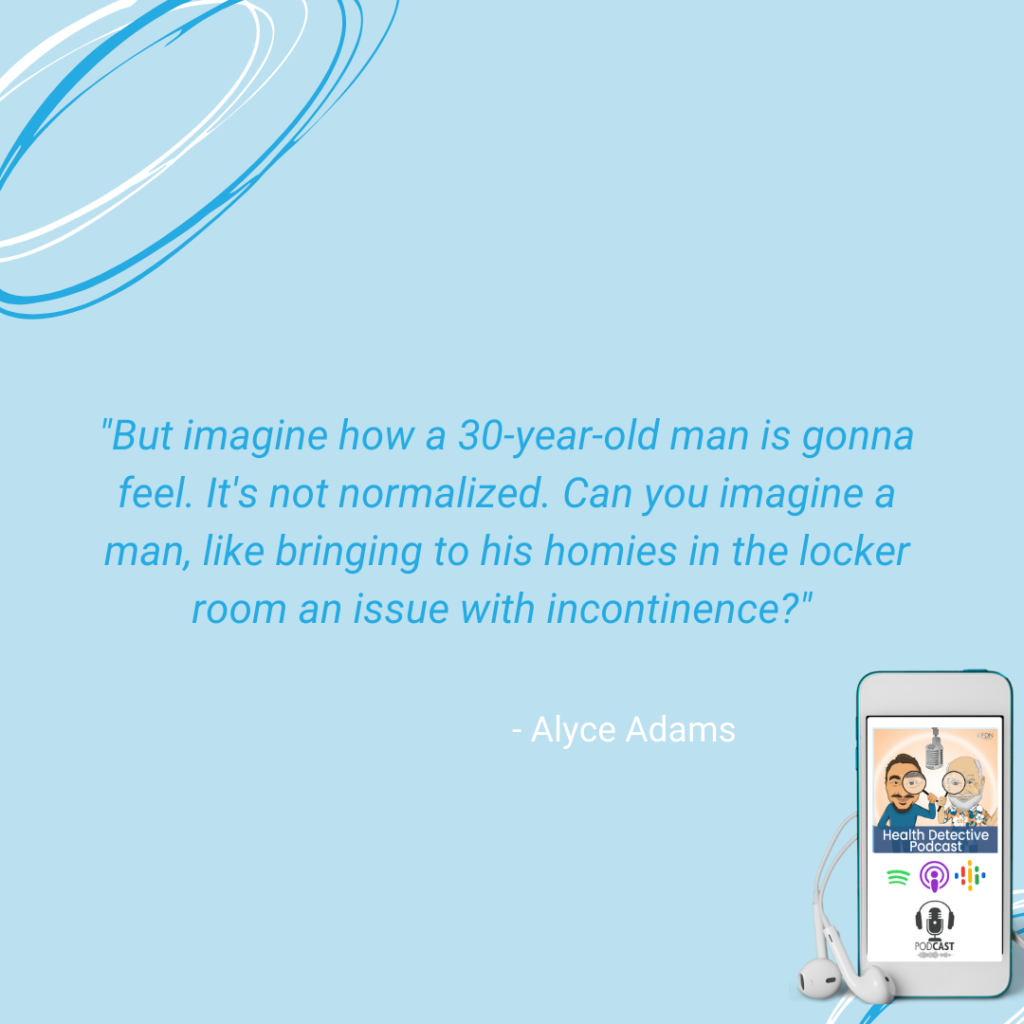
But imagine how a 30-year-old man is gonna feel. It’s not normalized. Can you imagine a man, like bringing to his homies in the locker room an issue with incontinence? I mean, the lack of emotional safety men provide each other for something like this. I can only imagine the overwhelming, emotional impact that would have on a man.
[00:32:07] Detective Ev: Yeah. And just the treatments that these people do get. I’m not gonna sit here and be graphic, but like the craziest thing that he told me was at physical therapy they need to, you know, work on certain places. It’s a female physical therapist, but I’ll put it this way, folks. Even for most straight men, you don’t want to be touched there, I’ll put it that way.
So, it’s as awkward as it can possibly get. I think it would be wonderful if people did talk about this. I’m not saying that’s gonna make it better when the physical therapist has to do their thing. That’s gonna probably be awkward until the day that humans don’t exist anymore.
Being Informed Can Help with the Feelings of Isolation
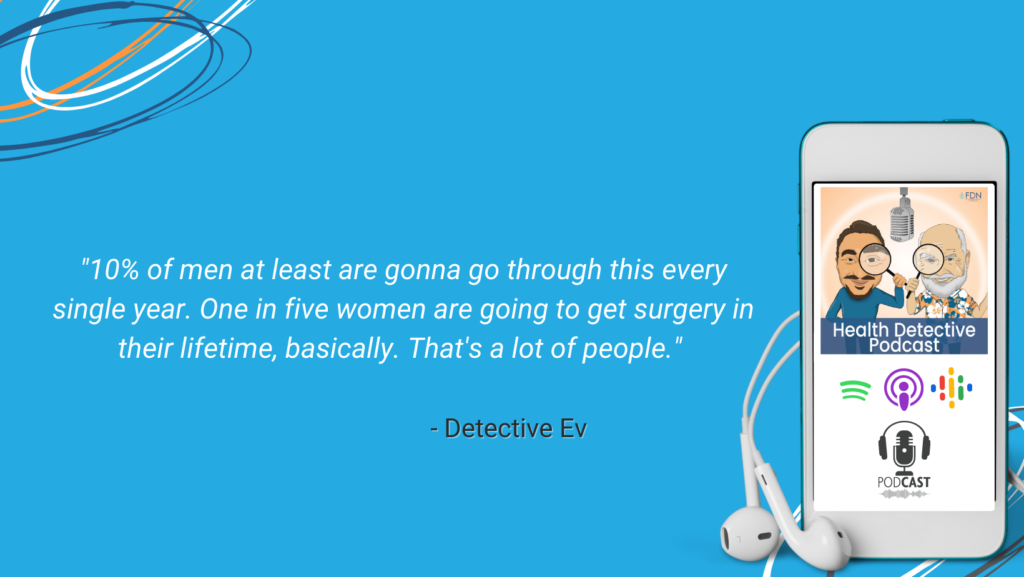
But at the very least you don’t have to feel isolated on top of it if you had the education to know, okay, wait a second. 10% of men at least are gonna go through this every single year. One in five women are going to get surgery in their lifetime, basically. That’s a lot of people.
So, I’ve heard of kegels. I would’ve actually called it kegels before you said it, that just shows how private it is. I’ve just read about it. I’m not saying that’s correct. My point is like, since I only have ever read it online, really, I wouldn’t even know how it’s pronounced.
I’ve heard about this for men. It’s always seemed like a smart thing. I was like, okay, this is like a general health thing in my health journey. I found out about it. I’m not too religious with it, to be honest. But I do think it’s a valuable tool and I think it’s probably something everyone should be doing.
Just in case we have someone clicking on this today, cause I’m gonna imagine this is a boat many people fall in that might not even know what the kegel thing is. Let’s just define it. What is this and how come both men and women can do it? Even if we’re talking about women today. How come both of them can do it?
[00:33:27] Alyce Adams: Sure.
Our basic anatomy as males and females, you know, we all start out the same way, as embryos. And then we differentiate. A lot of what we have is the same, still. Despite the major differences down there, we have a lot of things that are still the same.
The Kegel Queen – Basic Anatomy of the Pelvic Floor Skeletal Muscle
The pelvic floor for all of us is basically a bowl or a hammock of muscle at the pelvic outlet.
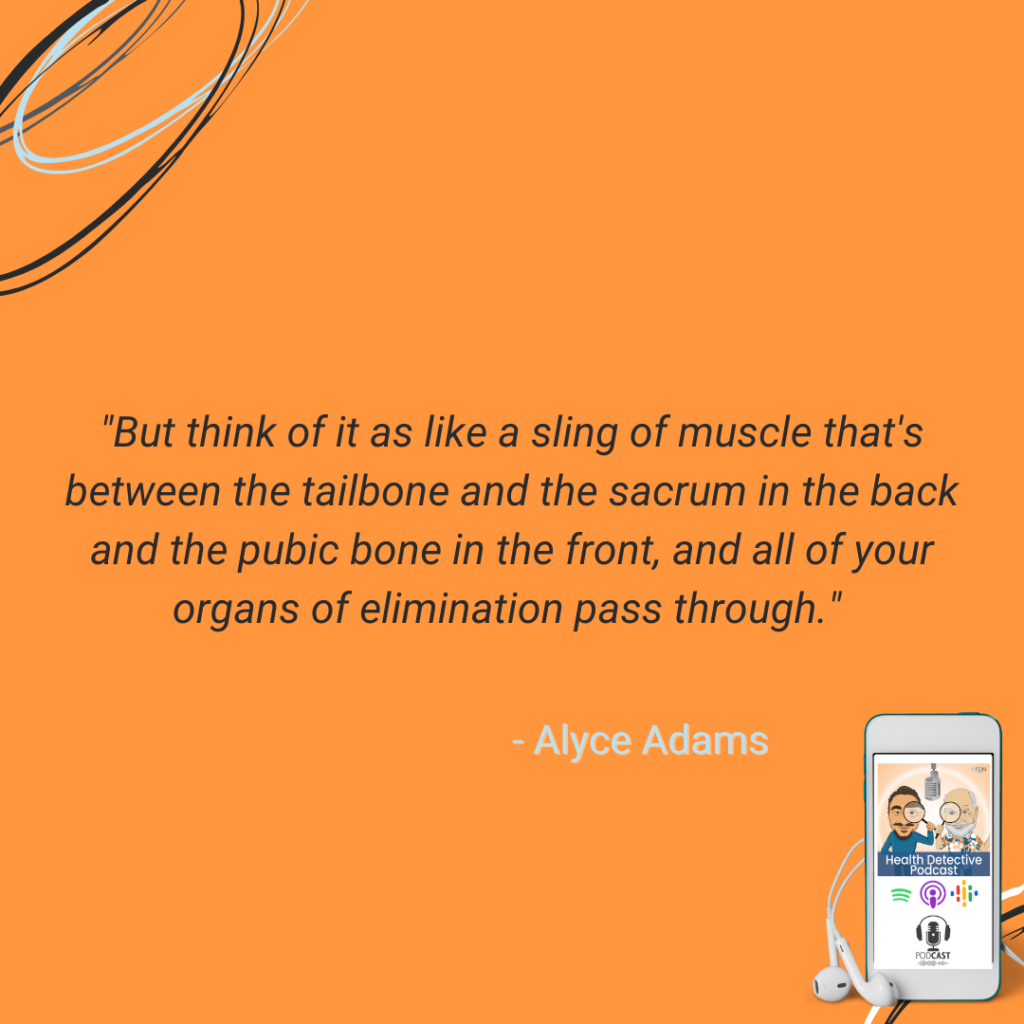
So, it’s like between your tailbone and your pubic bone. You could think of just a super oversimplify here. It’s attached to the sacrum as well. But think of it as like a sling of muscle that’s between the tailbone and the sacrum in the back and the pubic bone in the front, and all of your organs of elimination pass through. Your sex organs pass through.
For men, it’s the same thing. There are gaps in the muscle. And again, like I’m not super familiar with male pelvic floor anatomy either. But the basic idea is you have these muscles and it’s skeletal muscle. It’s not smooth muscle. Just in case somebody else is listening who’s not a health nerd, you have different kinds of muscle in your body. There’s smooth muscle, which is like in your organs, like in your gut. In your gut, you have smooth muscle, which is generally not something you control. Then you have skeletal muscle, which is the kind we think about like your biceps or whatever, the kinds of muscles you see under your skin.
Your pelvic floor is skeletal muscle, which means it’s muscle you can control with your mind with your decision. Just the way you say I’m gonna lift my arm, you can say I’m gonna contract or release my pelvic floor. Kegel exercises are basically contractions and relaxation of the pelvic floor, deliberate conscious contraction and relaxation of the public floor.
The Kegel Queen – Distinguish What a Therapeutic Kegel Is
If your goal is only to get in touch with that part of the body, to be familiar with it, to have a brain muscle connection there, it doesn’t matter how you do it. Like for a young man, for example, presumably not having issues, it can be simply interesting, particularly in bed to just play with those muscles.
What does it feel like if I contract? What does it feel like if I relax? What does it feel like if I pulse it? What does a light contraction feel like? What does an intense contraction feel like? Just play. Then at the other end of the spectrum, for (again, I don’t know what the therapeutic protocols are for men), but for women you need a very specific set of protocols in order to do therapeutic kegels that are gonna actually address a problem.
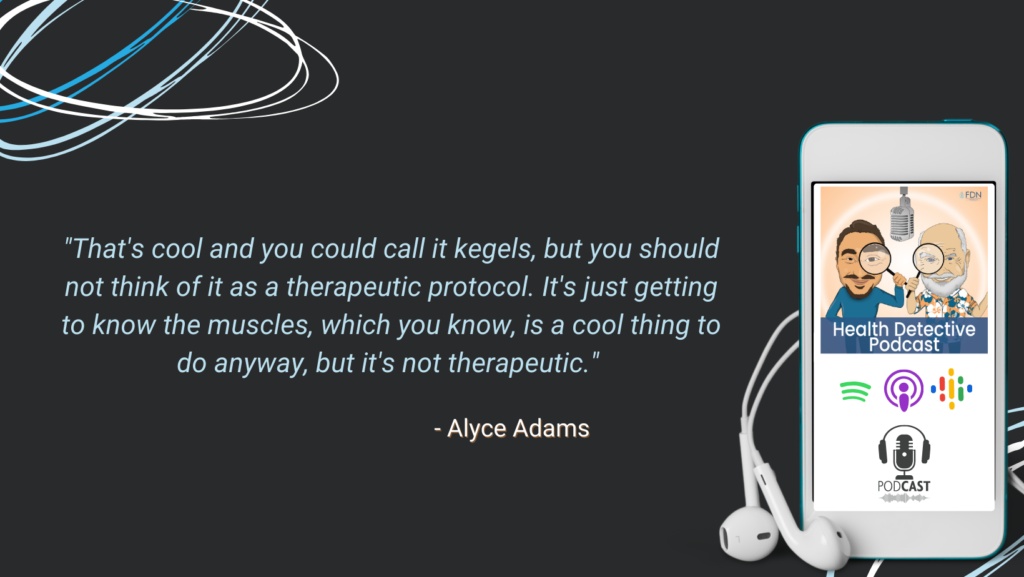
That’s kind of where a lot of a gap is in the popular literature and also in the teaching in doctor’s offices and in childbirth classes. It’s simply knowing how to contract and relax your pelvic floor. That’s cool and you could call it kegels, but you should not think of it as a therapeutic protocol. It’s just getting to know the muscles, which you know, is a cool thing to do anyway, but it’s not therapeutic.
The Kegel Queen – Limit Your Experimentation
[00:37:06] Detective Ev: Okay. The last thing I want to do is start misleading people on something I’m ignorant on. I think this might be one of the only things I can offer if I’m right here. I have heard online, and I would assume this would apply here considering these people lose control of their bladder or they sneeze pee or whatever. I think this would make sense. I had heard before, even though we don’t wanna be doing this every single time, I’m not suggesting this health wise. I had heard that while you’re urinating stopping that flow of urination could be an instant way to learn to recognize the muscles that you’re referring to.
Is that correct?
Alyce Adams: Kind of.
Detective Ev: Okay. Alright. Forget I said it.
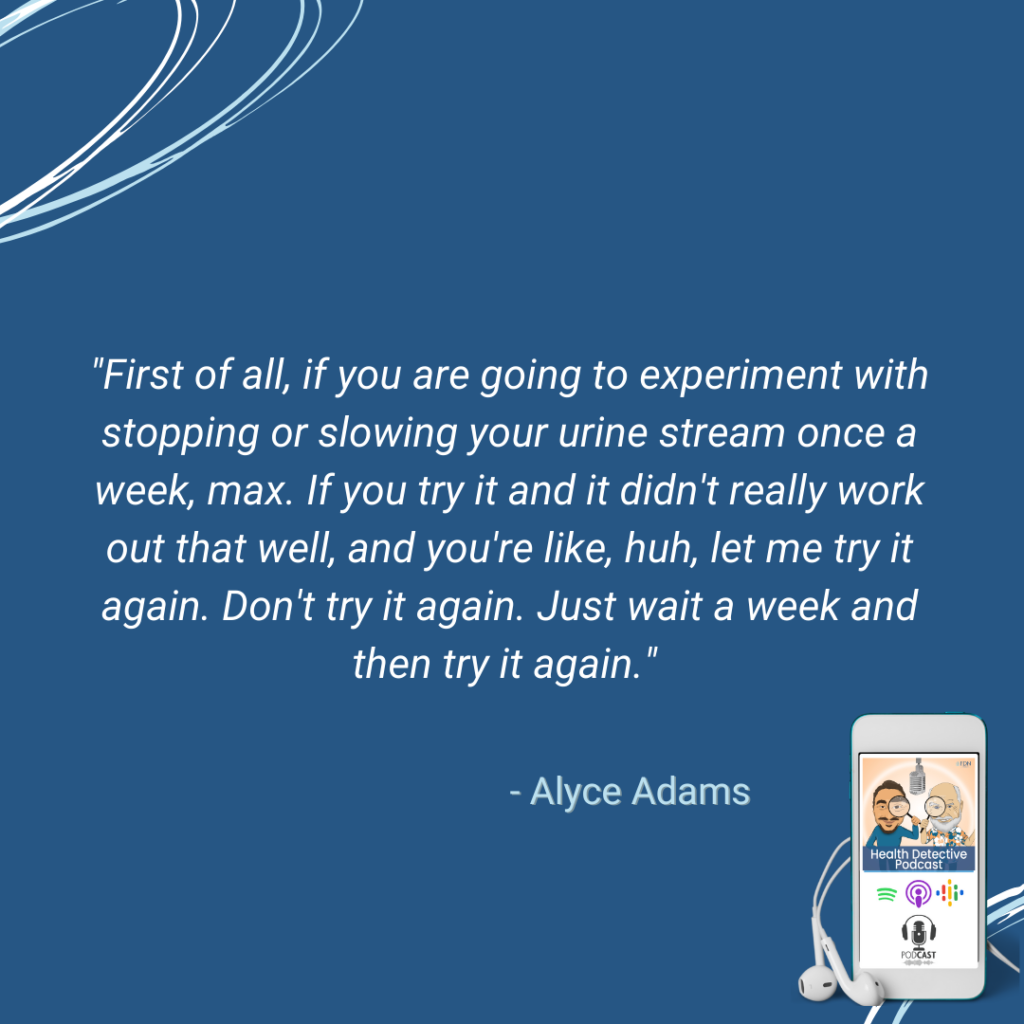
[00:37:41] Alyce Adams: Yeah, kind of. First of all, if you are going to experiment with stopping or slowing your urine stream once a week, max. If you try it and it didn’t really work out that well, and you’re like, huh, let me try it again. Don’t try it again. Just wait a week and then try it again.
So, with that caveat would you like to do one good kegel with me, Evan? You can pretend you’re female, and one good therapeutic kegel?
[00:38:12] Detective Ev: Well, you know what? You start out with episode five, we’re talking about cancer and here we are episode 150 something and I’m doing kegel’s live. So, sure. Let’s go after it.
[00:38:21] Alyce Adams: All right. Everybody listening, you can do this too. And we’ll talk about why this is therapeutic.
This is what I call the movie star exercise. So, you’re gonna please close your eyes and imagine yourself having dinner with someone you really wanna impress.
The Kegel Queen Describes One Good Therapeutic Kegel
Maybe it’s your favorite movie star. I like to think of Denzel Washington, approximately age 40. Other people may be thinking of others. Anybody you want is cool. Somebody you really wanna impress, that’s the key. You’re in a secluded corner of a quiet restaurant. You’re having your dinner. And this person really starts to open up to you.
They’re telling you a really intimate, personal story, and all of a sudden out of nowhere, you have an overpowering urge to pee and pass gas at the same time. So, hold it back as strongly as you can. You do not wanna ruin this moment. Hold that back. And then relax completely. That is one good kegel.
There are four pieces of that that make that a good quality therapeutic kegel for women. One is that you’re not just using your, hold-your-pee muscles. The biggest strongest muscles in the pelvic floor are called the levator ani muscle group. And even you, health guy, you’re avoiding using the word anus. People hate the word anus. People hate it. But the fact is, this levator ani muscle group in Latin, it means lifts the anus.
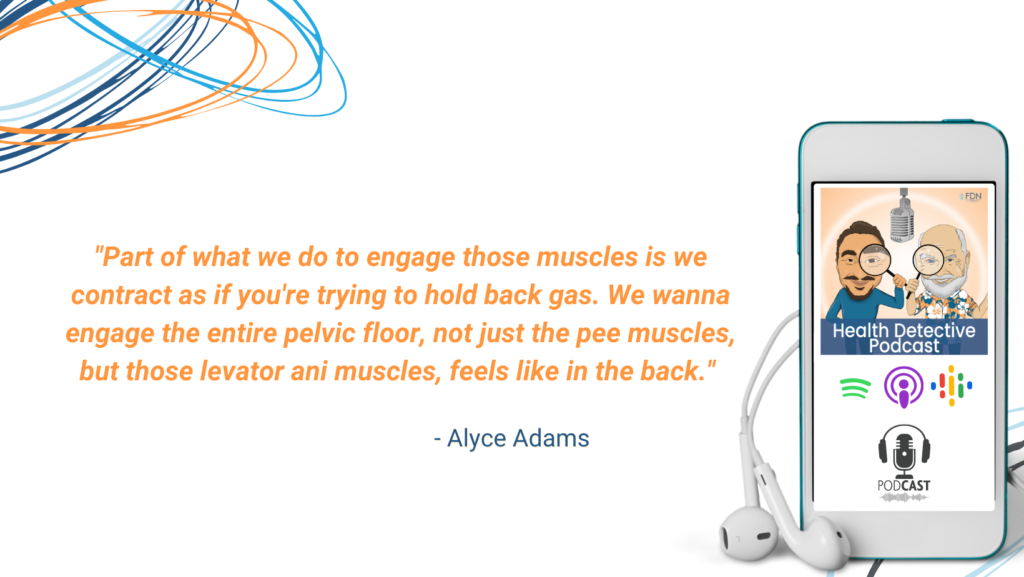
Part of what we do to engage those muscles is we contract as if you’re trying to hold back gas. We wanna engage the entire pelvic floor, not just the pee muscles, but those levator ani muscles, feels like in the back. So that’s part of it.
The Kegel Queen – Focusing on Relaxing is Key
Another piece is that we wanna have a maximum intensity contraction. We wanna activate those type two muscle fibers. A light contraction, you’re activating your type one, your postural muscle fibers, the ones that are firing all the time. You wanna jack up the intensity so that you’re involving those type two muscle fibers. Those are the ones that are gonna develop and give you the increased muscle mass that we’re really going for.
Muscle mass is only part of what proper Kegels do. Another piece is a sustained contraction. We’re not doing little pulses. This is something people are taught to do is like, pulse, pulse, pulse. No, we’re doing strong, intense, sustained contractions and we are relaxing completely. This is another piece that’s often overlooked. I think culturally, we have this bias toward doing.
I like to share the joke, how many Zen masters does it take to change a light bulb, Evan?
[00:41:40] Detective Ev: I got nothing.
[00:41:43] Alyce Adams: Two, one to change it and one not to change it.
[00:41:48] Detective Ev: Okay. Yeah, that was wise, if anything.
[00:41:50] Alyce Adams: It’s not like a pee your pants kind of joke.
[00:41:53] Detective Ev: Not sneeze pee. No, definitely not.
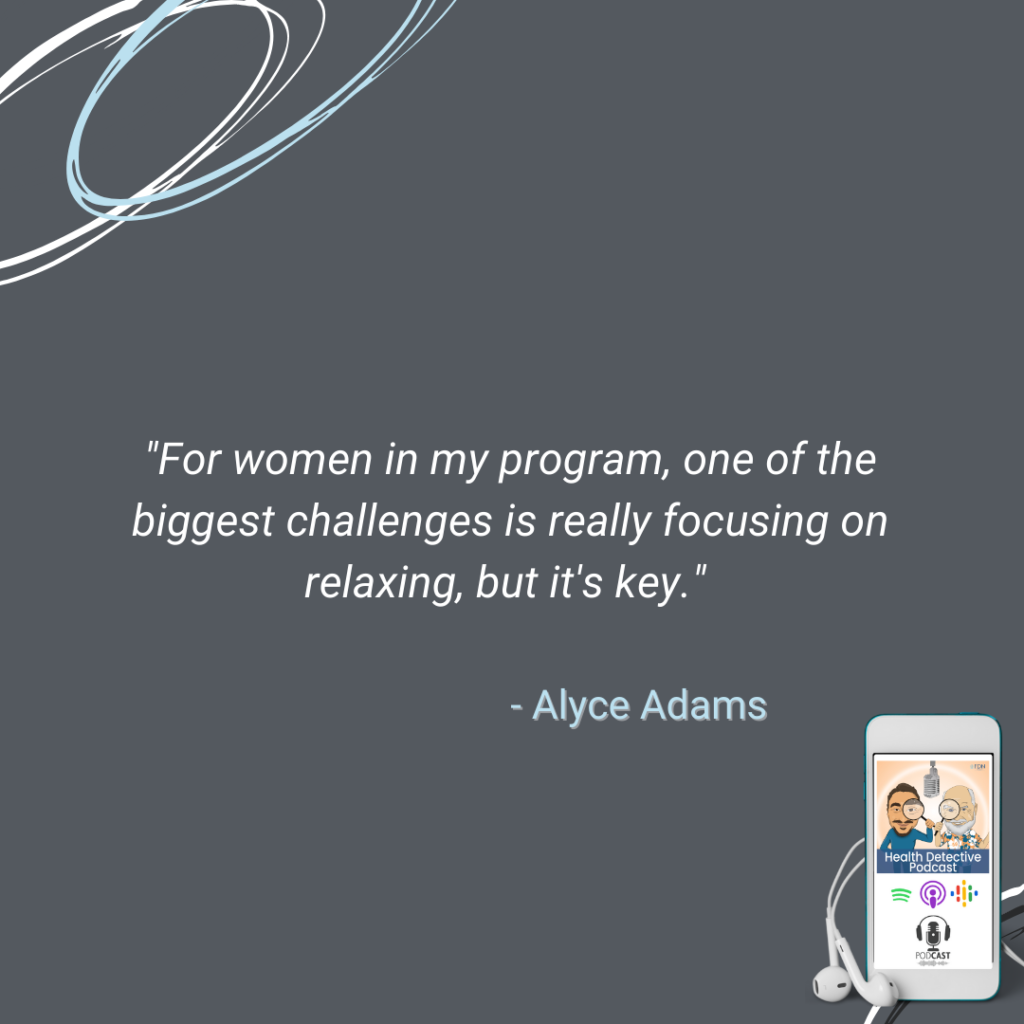
[00:41:54] Alyce Adams: In our culture, in the west, this idea of not doing, doesn’t even exist. For women in my program, one of the biggest challenges is really focusing on relaxing, but it’s key. It’s key because the worst thing is to end up with a tight clenched pelvic floor. We wanna work it out hard and relax it really well and very consciously relaxed, completely.
Those are some of the things that make the difference between I’m gonna call it Cosmo type, magazine Kegels and the real thing.
The Kegel Queen Advises on Dangerous Device Options
[00:42:37] Detective Ev: I know how this works, and this is true with anyone that comes on the show. I think it’s gonna be even more true with this topic. We’re gonna have people that do actually need this. They listen to it and for whatever reason, they still, okay, I’m not gonna do the group or whatever.
Now, some people always will. It’s just how it goes. But others are not gonna do it. So, I think at the very least today, because we probably can’t teach them everything that’s good. You already gave a great example in exercise. I think that’s a good visual that really actually helps.
What are some of the things then maybe that you’ve read in these magazines or online that we can at least tell the audience, don’t do this at all. If you’re doing this, this is bad.
[00:43:10] Alyce Adams: Yeah. I’ll start with the one that’s actually dangerous. There are all different kinds of kegel devices. All different kinds. There are a lot that are ill advised. I think they’re all unnecessary.
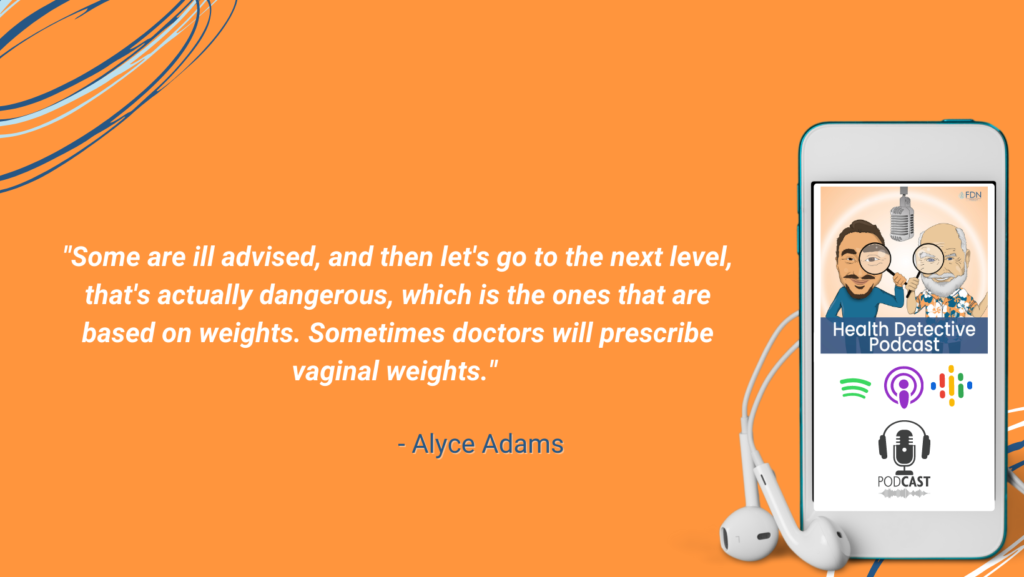
Some are ill advised, and then let’s go to the next level, that’s actually dangerous, which is the ones that are based on weights. Sometimes doctors will prescribe vaginal weights. They’re like, you start with a light one, you progress to heavier ones. There are like jade eggs people use different ways.
But anything that you’re supposed to hold in your vagina and just hold there, like while you’re vertical or even if you’re just like holding it in. Vaginal weights, you’re supposed to like put it in and then go do the dishes or something for half an hour. This is a really bad idea. Because you’re training your muscles to clench.
The Kegel Queen Explains Some of the Harmful Effects
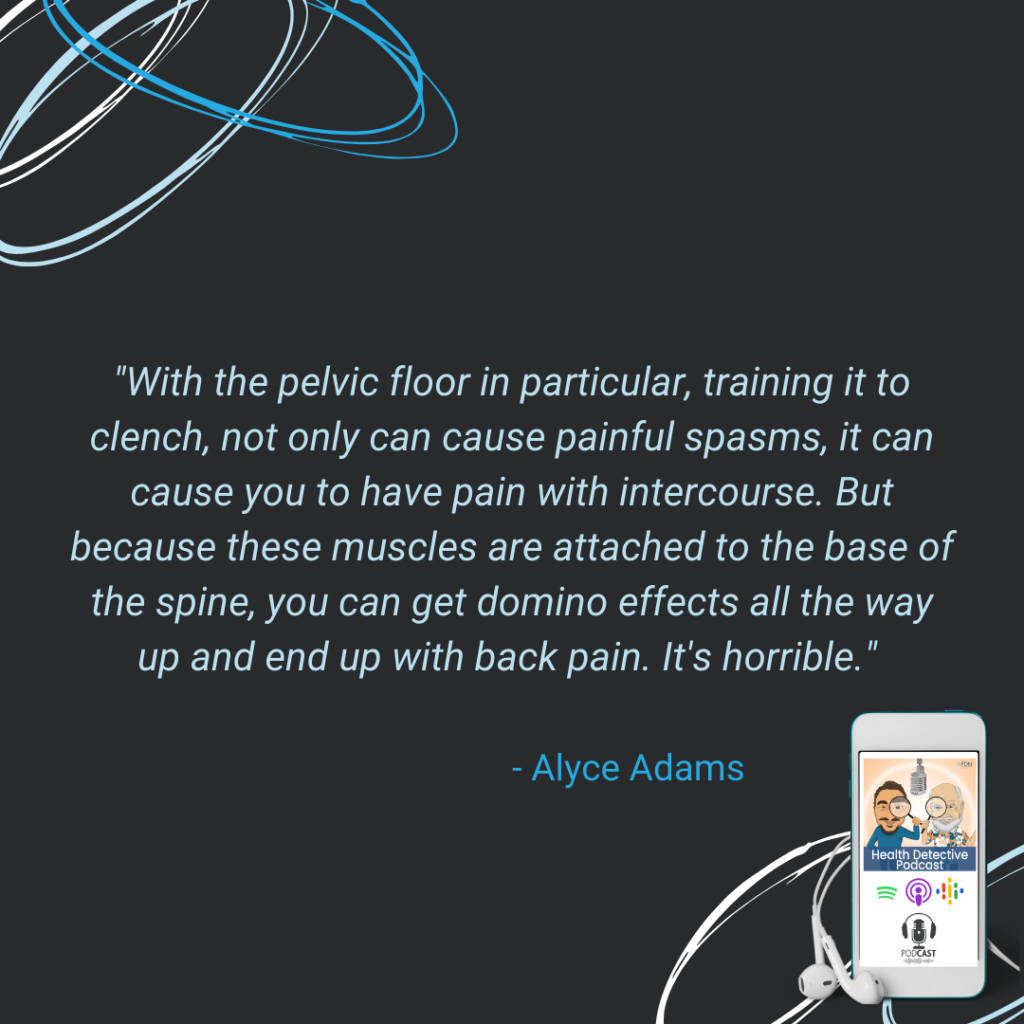
Any muscle in the body it would be bad to train to just clench. With the pelvic floor in particular, training it to clench, not only can cause painful spasms, it can cause you to have pain with intercourse. But because these muscles are attached to the base of the spine, you can get domino effects all the way up and end up with back pain. It’s horrible.
That’s the number one “don’t”, I would say, is any device that is based on a weight that you’re supposed to just hold in. That’s like dangerous. Then there’s stuff that’s just ineffective and useless and gives you the wrong idea that kegels actually don’t work, such as 200 a day, doing them when you’re at a red light, or in line at the bank, or whatever. These are simply just not helpful.
[00:44:53] Detective Ev: Okay. Actually, of course, it makes sense why I wouldn’t know about this. I’m sure this is more commonly known with women. But I think there’s plenty of women that probably don’t know about this stuff. I’ve never even heard of something like the weighted one or jade egg.
I do not have a vagina. I would imagine that is not fun to be walking around with that and having to hold this all day. Like, you kind of equated it to an egg, right? Like you almost feel like it’s hatching or laying an egg or something. You have to hold it. That doesn’t seem fun. We’re not hens, we are humans. So, we’re not gonna be doing that.
[00:45:21] Alyce Adams: With the jade egg, training where you’re just holding it, that’s bad.
Where to Find the Kegel Queen
[00:45:26] Detective Ev: Gotcha. Gotcha. Don’t do it for this.
So, we’ve talked about kind of how to do it right to the best of our ability. We definitely talked about what not to do. Where can people find you? And just to be clear for the audience, what is it that you offer? Am I gonna work with you one on one? Am I buying a book? Am I doing a group? Maybe it’s all of those things. I’d love for you to break that down.
[00:45:45] Alyce Adams: Sure.

You can always find me at kegelqueen.com and that’s K E G E L queen.com.
The basic program that I offer is essentially a DIY home study course with support. The studies, research has shown that for women to succeed with a home study type kegel program, they need to have professional, interactive, support. So, it’s not generally one on one. But I do a live Q&A every month, and that’s a group Q&A. I do respond to people’s questions. You can post questions online anytime, and I respond to those online. There’s interactive support all month long. Then anybody who wants to can come on the live Q&A and we talk.
The other really important thing that I have discovered in this program (I’ve been doing this 13 years, so it continues to evolve.), that I figured out early on is that kegels are part of the picture. I mean, it’s just like if somebody had high blood pressure, you’re not gonna just give them seaweed or something. You’re gonna give them diet stuff. You’re gonna give them exercise stuff. You’re gonna give them mindset stuff. You’re going to find all the tools.
The Kegel Queen – Kegels Are Only Part of the Solution
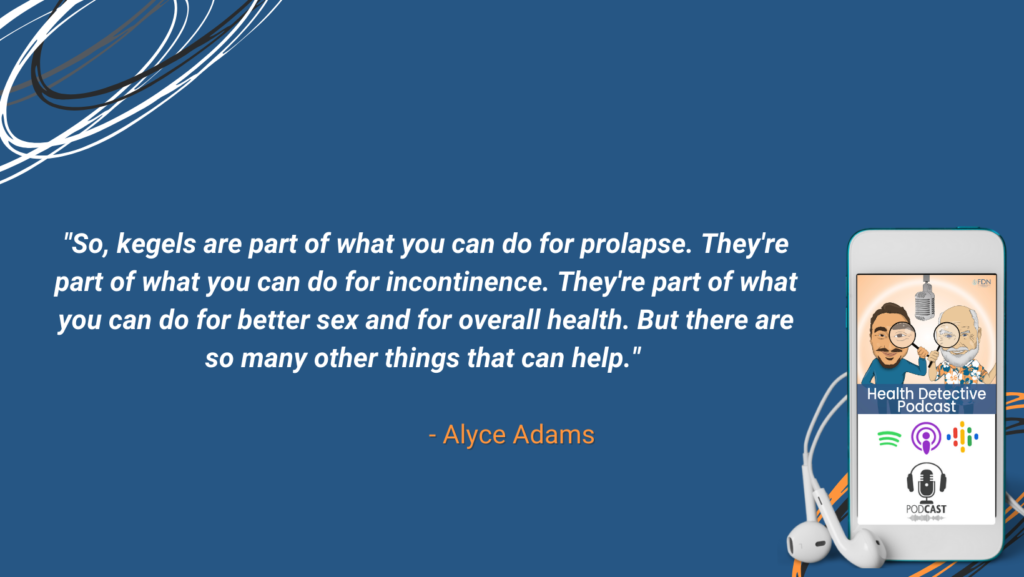
So, kegels are part of what you can do for prolapse. They’re part of what you can do for incontinence. They’re part of what you can do for better sex and for overall health. But there are so many other things that can help. And we talk about all that stuff. I have articles, we talk a lot about different things in Q&A about all the other things that can support you and actual treatments that you can use in addition to doing your kegels correctly.
[00:47:41] Detective Ev: That’s so cool. I love that you offer this to people and that’s a great URL. Did you have to pay extra for that domain name or was it still available, cause you started so long ago?
[00:47:48] Alyce Adams: No. In 2009 it was just sitting there.
[00:47:52] Detective Ev: I was about to say, yeah, nice.
For the last few minutes here, I love if we have the time to always, just maybe talk about a client testimonial. I know this is highly private, I’m not asking you to give the name and the address of the person. But just hearing like someone that came to you, maybe what they were dealing with, nothing was working, or they couldn’t figure it out and then they go through your stuff. And that was what finally worked for them. I’d love to hear that.
[00:48:10] Alyce Adams: Yeah.
From memory, I might have some of the language a little bit wrong. But the first person who leaps to mind is Chris from the UK. And I’m honestly not sure if that’s her pseudonym or her real name. Some people, we ask, you know, do you want us to use your real name?
The Kegel Queen Gives a Client Testimonial
She was so hurting emotionally with her prolapse. She had a rectocele, which is a vaginal prolapse of the rectum, and a cystocele, which is a vaginal prolapse of the bladder. She had both, she was so upset. She definitely used these words, “I feel disgusting.” She was really hopeless and discouraged and just bottoming out. Like, I’m not functioning in my daily life because this is driving me nuts.
She went through a trajectory, which is typical in my program. Like, oh, I found you, now I feel some hope. Now I feel that instead of just like, oh, what’s wrong with me? I have this problem. I don’t know what to do. I feel like a victim. Oh, here’s a roadmap for what I can do.
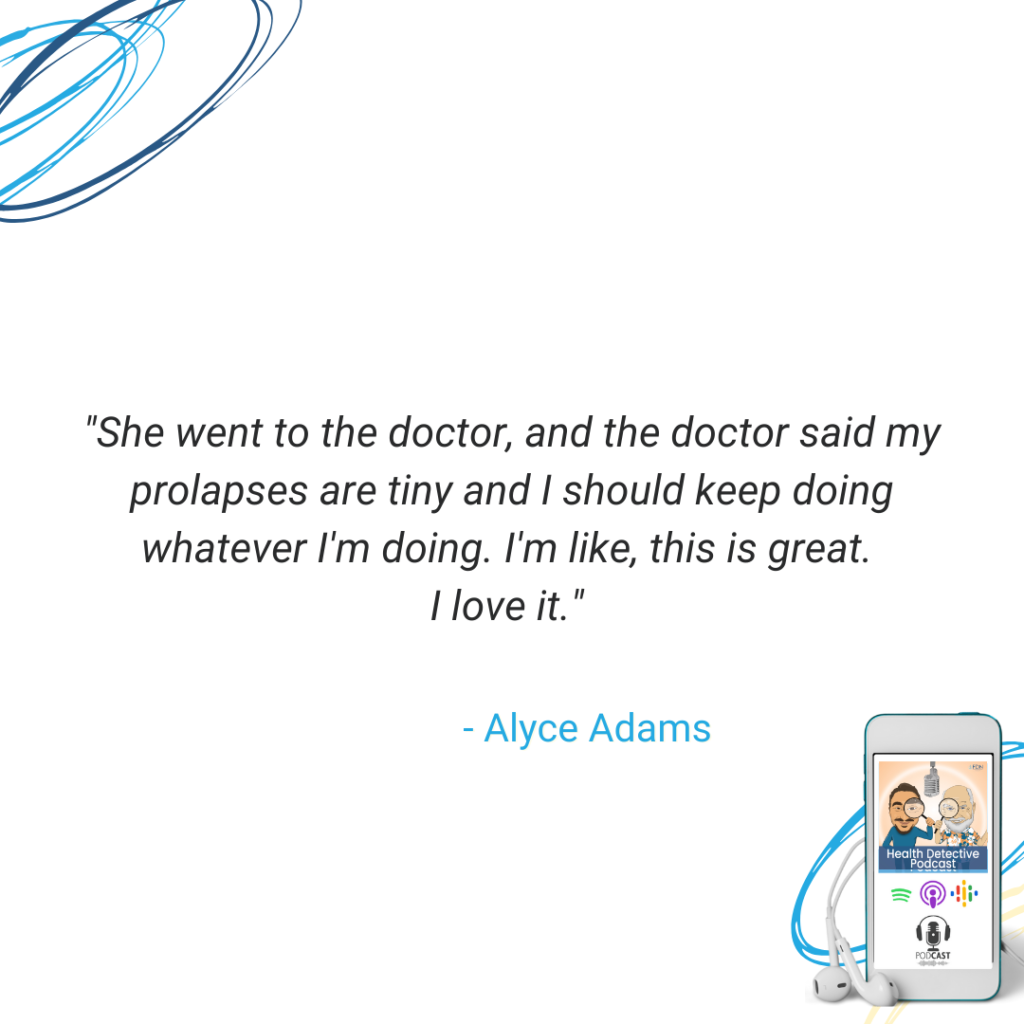
She, simply by engaging with kegels and figuring out that she could take ownership and do something, she started to feel emotionally better. She continued to write to me and keep me updated on her progress. Finally, she said, you know, I went back to the doctor. This is after however many months. You can look it up on kegelqueen.com, success stories. You can look and see Chris’s thing there. She went to the doctor, and the doctor said my prolapses are tiny and I should keep doing whatever I’m doing. I’m like, this is great. I love it.
You know that kind of thing, boy, it makes my day. When someone comes in and says to me (the first time this happened, I was totally freaked out, but now I’m like, yeah, do it), I canceled my surgery date when I found your program. Cause you know what? You could always decide to have surgery later. Reschedule, you know, this is not an emergency.
The Kegel Queen – Surgery is a Bad Idea as a First & Only Option
Like you’ve got a broken leg. Yeah, let’s see what else we can do.
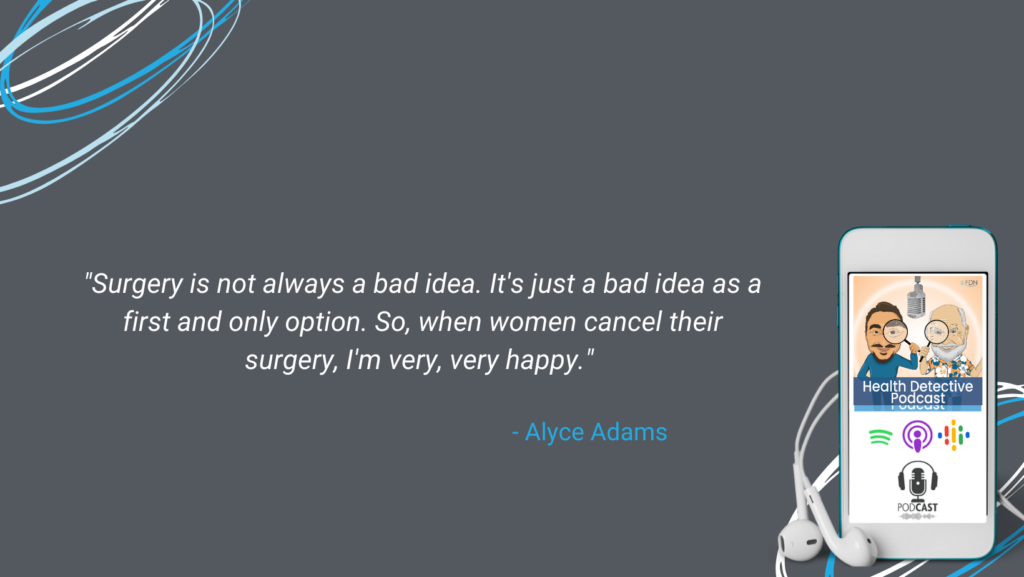
Reschedule if you have to. If you decide later, sure. Surgery is not always a bad idea. It’s just a bad idea as a first and only option. So, when women cancel their surgery, I’m very, very happy.
[00:50:37] Detective Ev: I love what you just said about that. You know, it’s not a bad option, but it’s just not maybe a great first option. Cause that is so true with so many things in our space.
And you know, it is rare for an autoimmune or cancer stuff. Well, not cancer as much, but autoimmune, for sure, that the surgery is the first route. But, you know, I don’t feel like enough natural stuff is tried at all. We’re talking about the other options are like a couple different pills and if they didn’t work okay, cool, then we’ll just take it out. Right?
That’s what happened to my mom. You know, she’s actually been on this podcast. It was just years of medication changes and all this stuff. And then it’s like, okay, well that didn’t work so we’ll remove your thyroid, as if that’s the problem. I can at least somewhat buy the whole appendix thing because of course, like once it’s actually ruptured, that’s a serious thing, guys. Like, you gotta do what you gotta do.
But the thyroid is so interconnected with all these other things. And to think that anyone could believe that it’s just the thyroid causing this stuff. I mean, I digress. But it’s just nuts, you know?
Then in this situation, yeah. You have something that in almost every respect is not urgent, you know. It’s not comfortable, we don’t want people to suffer.
Health Detective Podcast Signature Question
Like you said, the risk factors are there, but it’s like only worse when you get older. Right? Or a very long time of having this, this isn’t overnight. You got some time to try different things. Your protocol doesn’t take three years. Like why don’t you try something else?
So, we talked about where people can find you, client success story. I think that’s cool too. I can’t relate to this as much emotionally, but I can use my head and think, like this is probably a pretty emotional experience for someone. Especially when they get to the other end, and they find out maybe I don’t need this surgery.
But Alyce, I wanna finish up today since we’re at our our time. You are an RN by trade, so I think this is still a relevant question to ask you. It might not be related to what we talked about today, but it’s our signature question on this podcast. I’ll finish up with this. The question is, if I could give you, Alyce, in this case, a magic wand, and you could get every single person in this world to do one thing for their health, whether that’s literally do one thing or not do one thing, what’s the one thing you’d get them to do?
[00:52:30] Alyce Adams: To understand or decide that their health is in their hands.
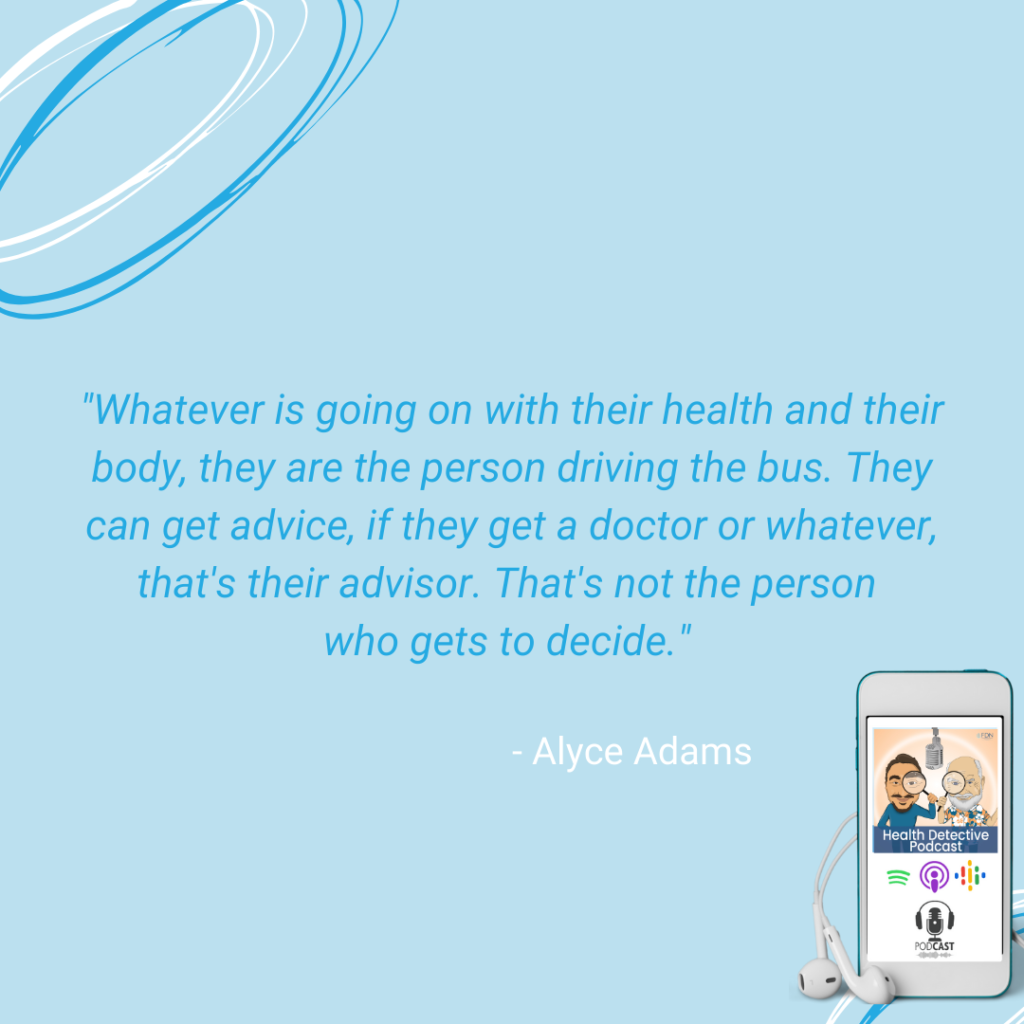
Whatever is going on with their health and their body, they are the person driving the bus. They can get advice, if they get a doctor or whatever, that’s their advisor. That’s not the person who gets to decide. They really are the decision maker and the driver. What they decide and do matters a hundred times more than what anyone else does about their own health.
Providing You with Value
[00:53:04] Detective Ev: All right, guys. That’ll do it for today’s episode with Alyce Adams. I really loved her story and her dedication to what she’s doing. She has such a professional way and transparent way of talking about something that I would imagine as a woman is kind of awkward to talk about. I feel like this is probably stigmatized or shamed.
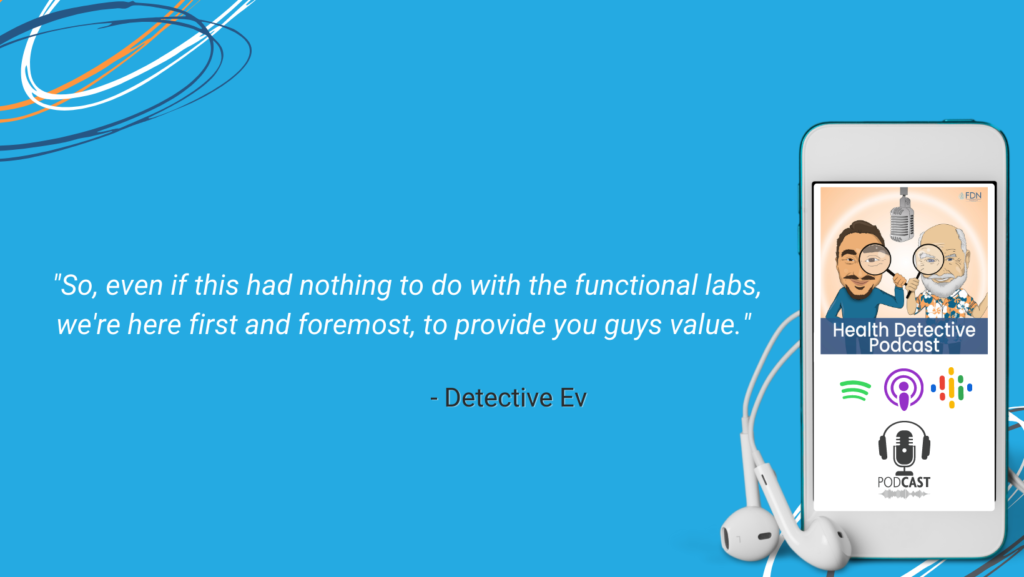
I give her a lot of props for just getting on here and doing her thing and really helping people out. I know statistically speaking that a good portion of our audience has to be dealing with this based on what Alyce said. So, even if this had nothing to do with the functional labs, we’re here first and foremost, to provide you guys value.
I hope that that’s what this did today. Now with that said, I will be back talking more FDN stuff on the next episode, I’ll actually be flying solo. If you guys like the stuff that we’re sharing, please consider leaving us a five-star review on Apple and/or Spotify. If you would do that, we would love ya even more than we already do.
Conclusion
And of course, the course is gonna go up a thousand dollars July 1st. I already mentioned that in every episode, pretty much, for the entirety of June. So please, if you are on the fence about the course or you’re considering it, go to fdntraining.com/summer.
If you’re brand new to this and you still need a lot more information about FDN, totally cool. Don’t even worry about that at all. But maybe hop on those events to learn something more. Maybe get your questions answered cause we’re being very involved this month, even more so than we already are. And we’re pretty involved, I would say, as it typically goes. I am looking forward to talking to you guys again next time. But until then, please take care.
You can always visit us at functionaldiagnosticnutrition.com.

